#spirit magic = gender affirming care
Explore tagged Tumblr posts
Text
I give what was promised
You’ve heard of trans zuko, and trans azula, but now get ready for the transgenderification of their shitty father

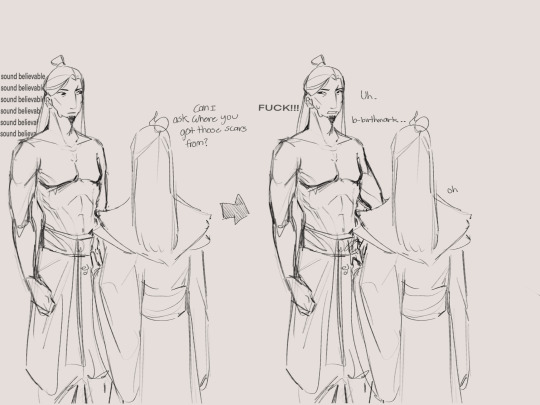

#ozai#atla#sulove’s works#TRANSGENDERFICATION BEAM#!!!!!!#Azulon probably barely noticed whenever his daughter changed into a son. he isn’t complaining#he preferred it even#spirit magic = gender affirming care#I don’t think I would even call ozai trans at this point#it’s more like he was a girl forced to adapt beneath the FN’s militaristic standards just so he could have worth in his father’s eyes#and trust he would do ANYTHING for it#I don’t like these drawings. hurls self off cliff
98 notes
·
View notes
Note
Second Years with a MC who is like Esmeralda from the Hunchback of Notre Dame(maybe include the pet goat?)
ColorMyTree is open! Feel free to leave a message on my Christmas tree. It’s free, so no money required. I also set it so that you don’t have to log in.
Disclaimers: I am not an expert on Romani culture. This is purely based on Esmeralda’s personality. Gender-neutral reader. Reader lives in Ramshackle, but is not Yuu. Characters include Riddle, Ruggie, Azul, Jade, Floyd, Kalim, Jamil, and Silver. In Silver’s, I put a small reference.
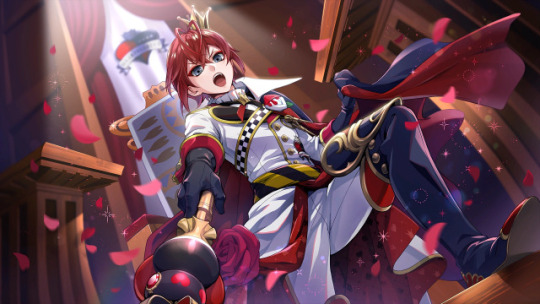
Riddle Rosehearts
You both actually despised each other at the beginning. You were very free-spirited and often enjoyed teasing him about everything just to make him upset. However, you always made sure to check in genuinely to see if you had gone too far with his boundaries. The first time you did that, he was actually surprised at the caring tone you had.
In classes, you were actually able to hold your own amazingly well. Not only were you competent, but you often found yourself neck-and-neck with Riddle when it came to answering questions and studying. However, unlike Riddle, you were also street-smart and not as naive, so you did feel a bit of a disconnect with him there.
Djali, your goat companion… familiar… whatever he was… he found him unsettling. He often headbutted into his leg whenever you both were walking together. However, he would switch up and lay in his lap when you both were in his dorm working on a project together. We just love a bipolar king, really.
Anyway, when you both end up getting romantically involved… everyone was surprised. However, it did actually happen that day you were at his dorm. The tension was clear to the both of you, and academic rivals turned into academic lovers. That was when Djali started really appreciating Riddle… especially since he could see that the Heartslabyul Housewarden looked at you as though you were the only being in existence.
Turns out, a free-spirited partner was really what he needed. After he overblotted, you took relaxation and breaks with him a bit more seriously. More dates, both large and small… more quality time… more words of affirmation… more physical affection like kisses and cuddles as well.

Ruggie Bucchi
You both related to each other on a book-smart and street-smart level. You respected his hustle, and he respected yours. However, you often danced for money, while he took up and assortment of odd jobs. Again, a hustle is a hustle, and game recognizes game.
However, he never realized how smart you were until you were both paired up during a project. Your goat seemed to like him, especially with how he settled into the hyena’s lap, which made you laugh a bit. But, that did lead to you pressing a kiss to Ruggie’s cheek as a ‘thank you’ for his help with a different assignment you were struggling with.
This was the start of your relationship. You often earned quite a bit of money as a performer at the Mostro Lounge, so you liked to spoil Ruggie with donuts whenever he had a particularly rough day in class, at his club, or serving Leona.
Everyone was a bit surprised to hear that the two of you got together. I mean, when you found out that Ruggie was behind Savanaclaw’s cheating, you were very upset and distanced yourself from him. However, he showed up at Ramshackle with a bouquet of flowers and some of your favorite snacks that he busted his ass to be able to afford for you.
From then on, you noticed that he always tried to make you happy, and the effort alone accomplished his goal since you loved him and his efforts. He considered himself a better person, especially with your encouragement to do better. Besides, the ear scritches were enough incentive.
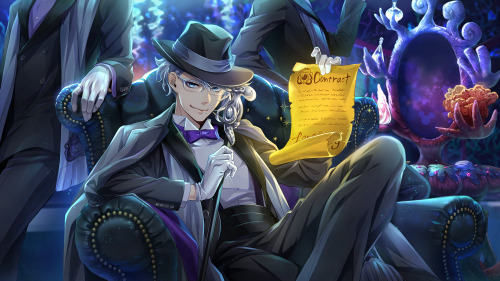
Azul Ashengrotto
You had originally applied to be an entertainer in his lounge, and he asked what you could do. Needless to say, when you pulled out all sorts of magic tricks, your goat, and your dance moves, he was sold and immediately put you on the stage. The pay wasn’t incredible, but you were able to afford a few more luxuries that Crowley didn’t bother with.
Other than that, you both didn’t have much interaction outside of boss and employee, but then you saw your friends get taken advantage of. You were angry and you quit right then and there, which harmed the Lounge. Curse you for being a social butterfly with connections, Azul thought. So, he let your idiots go, and you returned to the Lounge.
Ever since his overblot, you felt bad for pushing him to his furthest limit, so you made him a self-care basket as he recovered. That was the start of a more romantic relationship, where he genuinely apologized to you. He allowed you to quit the Lounge in place of being his partner, who he loved to spoil.
You didn’t know struggle as much anymore, which you were grateful for. Djali was very happy to receive some snacks every single visit, and often rested in Azul’s lap as he completed homework or paperwork for the Lounge, or conducted business deals. That solidified this relationship for you.
Everyone noticed that Azul seemed a lot more chill ever since he got in a relationship with you. He also noticed that he often carried a new handkerchief in his breast pocket. Turns out, it’s yours, and you sprayed your cologne/perfume on it. He just wanted to carry around a small reminder of his beloved partner.

Jade Leech
He met you officially when you started working for the Mostro Lounge. Your dancing was enchanting, to say the least, and Jade found himself intrigued. Often, he would ask about your homeland, Fleur City, and the plant life there. You didn’t have many answers, so you just shrugged and brought some seeds back during one of your breaks where you got to return home.
During the events leading up to his boss’s overblot, you both were on different sides of the battle. You wanted your friends’ freedom, stating that the deal was unfair and unachievable to begin with. Your magic disappearing trick was definitely one that threw Jade for a loop in the ocean scene, and the way you teased them about not being able to catch you.
To say that at the end of everything, you were angry at Jade, would be an understatement. You were absolutely furious. You took back the seeds, which were plants at this point, and even sold off the terrarium he had made for you during your friendship. Fortunately, Yuu convinced you to forgive him (totally not because they were forced to), and you agreed to hear him out.
Jade presented you with a new terrarium, as well as the old one you sold off when you quit the Lounge in order to pay for some necessities. He bought it back from the student and gave it to you, which nearly made you cry and apologize. You paid him back with a kiss, and he was greedier than before and asked for a few more.
That was the restart of your relationship. He was happy when you came back to the Mostro Lounge, and you both would spend your breaks doing homework at one of the booths. It was a lovely way to spend time together, and it was a great way to get assignments done as well. It did take a while for Djali to like him again, though.

Floyd Leech
You were one of the only people who did not mind his clinginess. You were used to it with Djali, so it was like having another animal familiar trailing you around. However, this one was over 6 feet in height, and he was an eel, not a goat. It didn’t matter to you, though, since he offered a great deal of protection in exchange for attention.
However, shit hit the fan when Azul put your friends under contracts that were impossible to carry through, so you went on strike. Not only did this hurt the Lounge in terms of revenue, since you were an entertainer there, but it also made Floyd angry that you were no longer hanging out with him.
After Azul overblotted, Floyd went to Yuu to ask for help in getting you to forgive him. Yuu had never seen a grown eel-mermaid get down on his knees and beg for help, but there is always a first time for everything. He repeated the getting down on his knees and begging when he got to your room, and you offered to cuddle the sadness out of him which made him happy.
Ever since you forgave him, he has definitely been happier. You came back to the Lounge, and he was often completely captivated by your dancing skills. Not only that, but you often spent your breaks together, with him clinging onto you like a koala and telling you about his day. It’s gotten to a point where Azul begs you to move into Octavinelle with Floyd so he wouldn’t be pouty at night.
So you moved in, and Floyd was in a giddy state 24/7. You came to his games, you spent your work breaks with him, you lived with him… it was all he could ever ask for, really. The next step was meeting his parents, and he was especially excited for you to meet his mom.

Kalim Al-Asim
You both were opposite sides where societal and financial class is involved. However, some would think that this is why your relationship worked. He loved spoiling you, even before he became your boyfriend. You always felt bad about it, but he reassured you that it was perfectly fine and that he would just spend more money on you if you tried to argue.
Unfortunately, when it came to Jamil, you were very wary of him. Sure, you both came from poorer backgrounds, but you were able to see the Vice-Housewarden’s plan. If only your boyfriend believed you. However, it was only a matter of time before Jamil overblotted and threw all of you to the ends of the dunes.
To say you were angry not only at Jamil, but Kalim as well for not listening to you, was an understatement. As you all swam back to Scarabia, Kalim looked like a kicked puppy as you avoided each and every one of his touches. Djali was very torn, since he loved both you and Kalim, which made Kalim even sadder.
When the entire ordeal was over, you went back to Ramshackle and just gave Kalim dry responses, which shattered his heart and nearly made him cry. So, he asked Yuu how he could make it up to you. Needless to say, when you got back to your room at Ramshackle, your entire room was flooded with bouquet after bouquet of your favorite flowers.
You forgave him quickly, especially as he hugged your knees and begged until he cried. Unfortunately for your lips, you had to smooch the sadness out of Kalim. From that point on that day, he was very happy, and so was Djali. He didn’t have to be a child of divorce anymore.

Jamil Viper
You both came from familiar backgrounds… and by that I mean you came from familiar classes. Born as lesser-thans, trying to make names for yourselves. However, you were not born into servitude. You served yourself, and Jamil envied you for it. He was born with the job of serving Kalim, which made you pity Jamil.
Anyway, you both officially met when you were paired together for an assignment. Turns out, you both were a lot more alike than you thought. So, you started hanging out more often. You showed him a lot of fun things that you do in-town right below NRC for low prices, and he swears that he has never had more fun than when he was with you.
Unfortunately for the two of you, life is not all peaches and cream, so he overblots. However, since you were his partner, he keeps you with him as a sort of ego-stroke. You were heartbroken at being used by him in such a manner, and when everything was dealt with and Jamil’s overblot was stopped, you cried in your dormitory and didn’t answer his calls.
Your boyfriend felt like absolute shit for treating you as though you were some worshiper rather than his beloved partner, so he came with a bouquet and a meal he prepared to apologize. He walked into your room quietly and set his gifts on the desk before sitting on the floor next to you to beg for your forgiveness… and because you are who you are, you forgave him. Djali had a bit of a rougher time doing that, though.
From that point on, you both had dates where you spent time together, and he reassured you that he genuinely loved you and it was the overblot telling you that he saw you as someone to worship. You attended each of his basketball games, which he appreciated since he loved having his partner there to cheer him on.

Silver
He had met you during one of your dancing gigs at the Mostro Lounge. He was meeting up with a project partner at the Lounge to discuss a few last-minute details when he saw you. To say he was entranced would be a complete understatement… until you tripped and fell off the stage. He rushed to catch you, and he was very glad he did.
From that point on, you often called him your ‘Knight in Shining Armor’, much to his embarrassment and his father’s delight. Often, you both could be spotted on campus with him laying his head in your lap and sleeping… and Djali lays on top of his stomach to nap as well while you finish up some homework. Sebek did not like you very much, not just due to your status as a human, but also because he thinks you joke around too much. Lilia loves you as a child-in-law and often jokes about asking when the wedding shall be. Malleus enjoys your company as a friend and as a sort of sibling-in-law, if that makes sense.
You eventually moved into Diasomnia, opting to cook for everyone so that they didn’t have to suffer through Lilia’s cooking. Silver’s room became yours as well, and you often put in little pops of color everywhere. Not only that, but Silver often carried arround the handkerchief you gave him which added more color to his usual outfit. Besides, every knight carries a favor from his partner.
Silver loved you a lot, to be honest. You always stood up and argued Yuu’s case to Headmaster Crowley, often using your connections inside and outside of school to gather power and support. After all, the bird would rather not get news of his mistreatment of a magicless student to get out to news outlets. Ramshackle has benefited from your willingness to fight against unfair treatment, and so has Silver.
#twst#twst x reader#twisted wonderland#disney twisted wonderland#twisted wonderland x reader#riddle rosehearts#twst riddle#riddle rosehearts x reader#riddle x reader#riddle#twst riddle rosehearts x reader#twst riddle rosehearts#twst riddle x reader#ruggie#ruggie x reader#ruggie bucchi#ruggie bucchi x reader#twst ruggie bucchi x reader#twst ruggie x reader#twst ruggie bucchi#twst ruggie#azul ashengrotto x reader#twst azul#azul x reader#twst azul x reader#azul#azul ashengrotto#twst azul ashengrotto x reader#twst azul ashengrotto#jade
178 notes
·
View notes
Text
Midnight Masquerade - Sister
Chapter Summary: The bottle lands on Sister. Awkward sapphic giggling ensues.
Chapter Warnings: 18+ minors be gone from this land; dryad!Sister x f!reader. kinks: bondage + vines/tentacles. awkward and cute sapphic flirting, first time, outdoor sex, very very brief mentions of space gender affirming care; author has never had a sexual experience with someone with fem-coded anatomy so I take full responsibility for any errors or misrepresentations of sapphic sex; if I missed anything, please let me know!!
A/N: come talk to me about Sister and gender affirming care for clones because I have Many Thoughts
Word Count: 2.9k
Read the intro here! | Suggested listening

...Sister.
Her eyes light up as the bottle comes to a halt, rocking in place on the table. Butterflies beat in your stomach at her excited, if shy, expression, the way she tucks a braided vine behind her ear. Fives claps Sister on the shoulder and pushes a fresh shot into her hands—which she hastily gulps down. Her green-tinted skin darkens a shade. Giving her a crooked grin, you stand and hold a hand out, silently beckoning.
She scrambles out of her seat and hurries to join you. Taking your hand, she threads your fingers together gently, the warm, calloused pads of her digits caressing your knuckles. You shiver in delight.
“Hi,” you say, breathless.
“Hey,” she says. “Where to?”
Glancing around, you take in the sight of so many transformed clones. You’d seen a back hallway earlier, but without knowing what lays beyond it, you’re hesitant to head that way. The blaring music, vibrating in your chest, is becoming a bit too much; the sickly sweet scent of the fog machines overpowers every other sense. A moment of overstimulation threatens to envelop you; Sister’s firm pressure on your hand grounds you. Fitting, you think wryly, appreciating her nature-themed aesthetic.
“Let’s get some air,” you suggest.
Without a word, she leads you through the packed dance floor to the front entrance. As you trail her, you can’t help but notice things about her that you’ve never picked up on before—things normally hidden behind plastoid armor and grainy holocall reception. Her dress, dappled in shades of green, threaded through with flowers of varying kinds, clings to her figure. Her legs, thick and muscled and long, draw your attention as you shuffle behind her through the crowd. Kark, you realize you’ve never seen any of the clones in such little clothing; Sister wears her verdant dress with the same ease and confidence as she does her combat armor. Heat swirls up your veins in time with your heartbeat.
Finally, she pushes the door open. You emerge into a landscape draped in silver moonlight; the massive crystals shine, their internal glow dim in comparison to the heavy, full moon hanging in the sky above. The cool night air washes over you and chases away some of the sweat and heat from the party—though it does nothing to assuage the slick warmth beginning to simmer in your lower belly.
Especially not when Sister tilts her head to the star-speckled sky and sighs, a contented smile curving her glossed lips. In the moonlight, she looks positively radiant, nearly aglow like the crystalline structures around you. Her hair, a tastefully braided mass of vines, swishes in the breeze.
Raising your joined hands, you gently press your lips to the back of her hand. Her eyes flutter open in surprise.
“Will you tell me what your costume is?” you ask. Having grown up on Coruscant, you’re not sure you’ve ever really seen so much green foliage in one place before.
Sister’s smile widens. “A dryad. A nature spirit. One of the planets we visited, the locals there told us stories about how nature spirits protect them in times of need. Said they’re the most beautiful creatures they’ve seen. I...wanted to be that, just for one night.”
Your heart leaps at her words. “I don’t think you need to dress up and drink a magic potion to be beautiful.”
“Oh, I know,” she says, winking. “I just wanted the extra confidence boost.”
“Is that so?” You tug on her hand and begin walking in a random direction, wanting to move away from the pulsing music, barely muffled by the doors behind you. “Any particular reason?”
She hums. “Maybe.”
You walk in silence for a few moments. Though she tries to hide it, you pick up on the nervousness in her gait and the nearly imperceptible way her grip tightens around your hand. The farther you roam from the building, the more peaceful the night becomes; at some point, the chirping song of crickets provides a new song to listen to. Beside you, Sister steals glances out of the corner of her eyes when she thinks you aren’t looking—except you’re doing the same, and you keep catching one another.
After a while, she draws a deep breath. “The reason is,” she says, “that I thought I might be seeing you tonight. Wanted to... I don’t know, dress up for you. My vod’e said that they do that all the time when they go out, but I’ve never felt the impulse until tonight.”
“Oh.” A shy kind of warmth blooms in your chest. “I— I don’t know what to say.”
When her face falls, you mentally kick yourself and hurry to explain.
“Not in a bad way!” you rush. “I just— well, I, um, I’ve never been with a- a woman before and- I—”
“Me either,” she says. She comes to a halt, bringing you to rest in the midst of a small clearing, shielded on all sides by pink and blue crystals. Her eyes remain on yours, dark wells of openness and vulnerability so raw it steals your breath. “Kark, I want to get this right, you know?”
Nodding, you offer her a small smile, one that she returns.
“First time for everything, right?” you say, voice quiet, afraid to disturb the peacefulness of the night.
She steps closer, her warmth enveloping you like a hug. Peering up at her through your eyelashes, you catch your bottom lip between your teeth, nerves and attraction and desire all coursing through you, colliding at the apex of your thighs. She smells like moist earth and sweet flowers and freshly-cut grass—smells you’re unfamiliar with but that you’re instantly able to identify. As the two of you move closer, chests pressing together, you can’t help the way your breathing catches in your throat.
“Sister?” you murmur.
Her eyes drop to your lips. “Yes, sweetling?”
“I’d like to kiss you.”
“I’d like that, too,” she breathes.
Releasing her grasp at last, you tentatively rest your hand on her toned waist, the fabric of her dress simultaneously smooth like glossy leaves and spongy like moss. You tilt her head down with a gentle, yet firm, grip on her chin—and then her lips are on yours.
It’s a tentative, chaste, sweet first kiss, and yet no less debilitating for it. Knees wobbling, you bite back a moan as she tilts her head, drawing you deeper. Her hands splay over your back to press you tighter against her, and you feel more than hear the satisfied groan when her breasts smush against yours. Sliding your hand from her chin to cup the back of her head, you lick at her lips.
She pulls back briefly and you worry, for an instant, that you’ve pushed too far—but her eyes are dark and blown with lust, chest heaving, and she dives back into you like a woman parched. Opening herself to you, her tongue meets yours and slides along it hot and wet and needy. You finally release the moan you’ve been holding, and she responds in kind.
“K-Kriff,” you gasp once you pull away. “Kriff, you’re so hot. Want you so bad.”
“I’m yours,” she says with a lopsided smile that makes your heart skip a beat. “Do you want to go back and find a r—”
“No,” you interrupt, perhaps a bit too aggressively, because she chuckles and kisses you again.
“Alright,” she says. She seems to finally take in your surroundings for the first time. “If you take your clothes off, I can make sure we don’t get too much dirt on us.”
Dirt? You distinctly recall there being a blanket of crystalline shards on the ground. But when you look down, this small clearing you’re in is a bed of warm soil. As you watch, a bed of grass and vines curls up through the soil and creates a roughly circular bed. Sister flashes a toothy grin at her newfound powers.
Smiling, you step back from her to shuck your clothes and lay them over the vines. When you turn to face her again, she’s also undressed, her tan and toned body gleaming dully in the moonlight. Your jaw drops. Fingers twitching, you ache to reach out and touch her, slick gushing between your folds.
Sister gives a shy smile. “I, um—well, the General pulled some strings. Got me the best gender affirming surgery the galaxy has to offer.”
“That’s amazing,” you murmur. “I’m really glad you have that much support.”
She hums. “Anyways. Want to apologize before we go any further,” she says.
Eyebrows furrowing in confusion, you cock your head. “What for?”
“Well,” she says, “this isn’t exactly going to be a ‘normal’ first time with a woman, is it?” She gestures to herself. “Not when I’m like this.”
“I mean, you have flowers in your hair, but what—” You cut off with a strangled gasp. The feeling of something warm and curious slithering up your leg sends a jolt of surprise through you. When you look, you find a vine, the same as Sister’s hair, just thicker, curling around the meat of your calf and climbing to your thigh. “Oh. Oh.”
She laughs. “So again, apologies.”
Your cunt throbs with need. “None needed. Kriff, c’mere.”
You tug her towards you again, lips colliding in a heated, passionate dance. There’s no struggle for dominance, just a give and take, push and pull, that leaves your head spinning and body alight with anticipation. Sister gently pulls you to the ground so that you’re kneeling in front of one another. As the vine continues to wind up your leg, your core tightens; when the blunt, warm tip of it brushes along the seam of your cunt, you gasp into Sister’s mouth.
“Tell me if it’s too much,” she says, gazing into your eyes.
Voice failing you, you simply nod your agreement. Your hands find purchase at her hips, squeezing the soft flesh there. Her thumb strokes delicately along your cheekbone as the warm head of the vine prods against your clit, then begins to circle it, slowly, agonizingly, sinfully. You keen, the pressure enough to make your entire body seize for a moment. Sister muffles your cries with her mouth.
“So wet for me,” she mumbles against your lips as her vine gathers some of your slick before returning to your clit.
One of your hands trails from her hip down between her thighs. Gasping, you trail the pad of your middle finger along her puffy lips, swollen and silken with arousal. It takes you a moment, not used to touching a woman’s anatomy from this angle, but once you find her clit, a surge of pride and victory lifts through you at the whispered sigh that escapes her. Her hips buck into your hand.
“P-Please,” she mumbles, dropping her head to your shoulder. “Please.”
“Please what?” you ask. Pressing a kiss to her cheek, you match the pace that her vine has taken up as it circles your own clit.
“I don’t know,” she says, voice tinged with humor and lust. “Just feels so good. So kriffin’ good.”
“Me too,” you murmur. “Can I taste you?”
The noise she makes sounds strangled, and you grin against the skin of her neck. She nods furiously. “Yes. Stars, yes.”
“Lay back.” You gently maneuver her onto her back—her vine never leaving your cunt, but never changing its pace or pressure—and spread her legs. In the moonlight, her pussy glistens. With a groan, you settle between her thighs and lower your mouth to her, too impatient to tease. Kriff, you’ve dreamed of this, of eating someone out until they sobbed for you, but you never thought you’d get your chance tonight.
She watches you, propped up on her elbows, as you close your lips around her swollen clit. Keeping your eyes on hers, you moan against her pussy, tongue tracing her sensitive nub, tangy taste exploding across your taste buds. Sister pants, skin dewing with sweat. Reverently, you reach up her body as you eat her cunt, fingers finding purchase around one of her breasts. Her head tilts back, column of her throat long and exposed. The sight makes your own cunt clench.
Licking up from her entrance to her clit, you’re distracted, momentarily, by the way her chest heaves with exertion—but the moment passes when her vine wanders down to your own entrance and probes gently. You flatten your tongue and eat her for all you’re worth, slurping her arousal, fingers tweaking her nipple. Sister groans, the sound drawn-out and breathy.
“F-Fuck.” Her grip on the back of your head tightens, holding you in place as she grinds her cunt over your tongue. “Fuck, wanna cum for you.”
All you can do is moan in agreement. With your other hand, you gather some of her wetness. You simply rest your finger at her entrance, the same way her vine is only barely pushed into your own cunt, but the hint of penetration makes Sister convulse, her pussy fluttering under your mouth. You seal your lips around her clit and suck, sliding your finger into her at the same time.
She cums beautifully. Her entire body locks up, her thighs threatening to close around your head, her eyes locked on yours as she comes apart, mouth forming a perfect ‘o’. You suckle her sensitive cunt through the entire thing, only backing off with a wet pop when she weakly pushes on your forehead.
Wiping her juices from your chin, you grin at her. “That was so kriffin’ hot.”
“Let me return the favor,” she pants.
Her vine finally pushes into your slick pussy with no resistance; you both moan. Pussy clenching around the intrusion, your hips buck involuntarily, seeking friction on your clit. Sister’s fingers are there immediately, slowly circling the bundle of nerves. Dimly, you’re aware of several other warm tendrils snaking over your sweaty skin: wrapping around your ankles, gliding up to your arms, one encircling your throat lightly. Sister tugs you forward and swallows your moans as your body is thrust over the edge of orgasm without warning.
Once you come down, body still twitching, you half expect Sister’s costume to revert to exactly that—but it seems that she is still a dryad, if the vines wreathing your heated skin are any indication. Sister peers up at you with hooded lids.
“How you feelin’?” she asks.
“Like I want to cum for you again,” you answer immediately.
She ducks her head. “Can I try something?”
You nod your eager consent. She positions you both so that you’re straddling her nearly sideways, one of her legs thrown up over your shoulder, and her other thigh restrained against your own with a pulsing vine. Another vine secures your arms behind your back, and a third continues to rest around your neck. Chest heaving in excitement, you roll your hips experimentally, soaked folds meeting Sister’s. You both whimper and whine.
“Think you can cum like this?” she says.
“Kark, yes.” You fidget with your stance as much as you can given the restraints, until you’re happy with the way that your cunt rests against hers. Rocking your hips, you toss your head back at the smooth glide of skin over skin, pussy against pussy. Sister watches you with hooded, adoring eyes, her face twisted in an expression of bliss with every thrust of your hips.
That hot, tangled web of pleasure begins to wind up again in your belly. Judging by the way Sister writhes beneath you, she’s getting close again, as well. You rub your cunt against hers feverishly, chasing a high that promises to shove you even closer to the stars than the previous one.
One more vine slithers up your front and taps against your lips. Without hesitation, you open your mouth. It’s warm and slightly sticky, and you groan around it.
“You’re so beautiful like this,” Sister gasps out. “Gonna make me fuckin’ cum.”
Curious, you give a tentative lick to the vine in your mouth. You’re rewarded by a particularly loud moan and a jolt of Sister’s hips. Chuckling, you repeat the motion, grinding your hips down harder. Sister keens, eyes screwing shut.
The pair of you cum together like that, her vines pulsing against your skin as she convulses beneath you; your own orgasm punching the breath from your lungs as you soak her. You don’t stop, jerking your hips in a sloppy rhythm as your cunt flutters, pleasure cresting through you again and again. Only when the vines retract, Sister’s hair and skin returning to their normal tones, the flowers wilting and scattering as ash in the chilled breeze, do you nearly collapse on top of her.
You catch yourself on shaky arms. Beneath you, her expression reassembles into something vaguely coherent.
She laughs. A matching giggle bubbles up from your chest and joins hers. Leaning down, you capture her lips in a kiss, sweet and short.
“Not bad for a first time,” you mumble against her mouth.
“‘Not bad’?” She scoffs playfully. “That was kriffin’ amazing. Fuck.”
Falling onto your side next to her, you pull her under the crook of your arm and press a kiss to the top of her head when she settles against your chest. Smoothing her frizzy curls, you sigh in contentment as you gaze up at the stars. Your combined body heat keeps the chill away; you’re in no rush to find your way back to the party, not with such a beautiful view up there, and an even more gorgeous woman beside you.

Ye Olde Ragu Liste: Ragu list: @the-hexfiles @thorsterstrudle @dystopicjumpsuit @clonemedickix @freesia-writes @littlemissmanga @wolffegirlsunite @anxiouspineapple99 @wings-and-beskar @sinfulsalutations @523rdrebel @sunshinesdaydream @moonlightwarriorqueen @sev-on-kamino @starrylothcat @deejadabbles @starqueensthings @mandos-mind-trick @idontgetanysleep @eyeluvmusic21 @wizardofrozz @mythical-illustrator @sleepycreativewriter @dreamie411 @bobaprint @originalcollectionartistry @imarvelatthestars @droids-you-are-looking-for @goblininawig @lune-de-miel-au-paradis if your name has a strikethrough, I can't tag you so check your settings! (if you'd like to be added or removed, click here!)
#clone trooper sister x reader#sister x reader#clone sister x reader#the clone wars#tcw x reader#clone x reader#hallowkink 2023#midnight masquerade#mdfm hallowkink 23
46 notes
·
View notes
Text

Mobian Witchcraft: Rouge the Bat
Epithets: the Treasure Thief, Diamond-Eyed, the Skilled
Canon Abilities: Flight, espionage, theft
Theme: Fly in the Freedom
Witchcraft Element: Air, Darkness
Colors: White, black, pink, purple, teal
Associations: Cunning, shadows, self-confidence, self-centeredness
Correspondences: Attracting fortune, money magic, glamour, self-care, sleight of hand, gender euphoria
Spirit Work Ideas: Imagine you're a gem from one of Rouge's heists, aiding with glamour (especially makeup), helping you "borrow" energy (or other things), protects you from energy vampires
Helpful Affirmations:
I am free to be myself.
I am worth the rarest treasure.
I take what I want.
I sparkle like a gem.
I move undetected, like a shadow.
*Disclaimer: I am a skeptical open label placebo witch. These are my personal associations for my practice. You're welcome to believe what you want and use what helps you.
3 notes
·
View notes
Text
Meet Itsuki the Lunar Sakura Angel [Mod Hua]

Name: Itsuki
Species: Lunar Sakura Angel [Exclusive]
Gender: Male
Pronouns: He/Him
Sexuality: Pansexual / Panromantic
Alignment: Light
Personality: Itsuki can only be described as a colorful character, with the interests of those around him at heart. Itsuki can be called kindhearted, looking out for his friends and acquaintances to the best of his ability. Although he is seen as a dependable individual, he is very particular in the areas of someone’s life that he will “intrude” upon. Being a true romantic at heart, matters of the heart are his specialty, and he takes his interests very seriously in that regard. It isn’t that he is disinterested in other aspects of people, however those are areas of someone else’s life that he isn’t the most comfortable speaking on. Not that he doesn’t care about things other than love and romance, they just don’t fall under his umbrella of expertise. With how he tries to support those around him, at times Itsuki can be insecure, switching from a more hyper focused state to second guessing himself and removing himself from the equation. (He is never quite sure how much leeway he has in someone else’s life, so whenever he becomes aware of how involved he has become, he tends to back pedal quicker so as not to cross any lines.) Besides assisting others in their own romantic endeavors, or otherwise, Itsuki can be described as an amorous personality. He will heap affection, praise and affirmations to those around him, as long as he has permission and consent to do so. Itsuki is the walking embodiment of affection, and he makes sure others know that, going so far as to push self love and care on others that need more of it. Getting starry eyed comes easily to Itsuki, and he is aware that he can come off strongly, when there is no buffer available, however he is mindful to boundaries, and respects whatever limitations are set.
Description: Itsuki embodies the idea of “feminine but in a masculine way.” His hair is a choppy, layered mess that falls in a violet, magenta, lavender mess just past his chin, framing his face in a way that makes his features appear more heart shaped and delicate at first glance. With wide, angular eyes that fade into a pale lavender and peach of sakura blossoms under a full moon, it is an understatement to say his looks are alluring. Lips tinted in a deep amaranth at their center, he can always be seen with a crooked half smile of sorts, his bashful flirtation making him appear as the perfect cross between angel and incubi. Branches of cherry blossom trees, and budding blossoms in lilacs, lavenders, indigos, mulberry, and pale rose span along his arms, shoulders, up along his neck, all the way down his hips and legs in a living tattoo. The petals flower and wisp to his finger and toe tips before fading away from his skin, leaving them a touch more rosy in the process. Sakura petals grace his hair, giving him the look of having strolled through a grove of trees as the blossoms were falling, even though his hair seems to produce them from nothing. Itsuki keeps to flowy clothing, loving the feel of a more androgynous look, with the added bonus of a fluidly moving set of clothing.
Hobbies: Painting ceramics, teasing friends, incorporating unconventional ingredients into food, candle carving, experiencing different cultures through food, star gazing, following the lunar phases in ritual, and ice skating.
Likes: The full moon, floral scents, dusty pastel colors, feathers, soft fabrics, crystal points, the taste of strawberries and cherries, physical affection, candles, and snow in the moonlight.
Dislikes: Hateful people, spiteful actions, war, prejudice, racism, hate speech, misogyny, manipulation, narcissism.
Favorite color/s: Dusty lavender and mauve
Favorite animal: Bleeding-heart Dove
Favorite song: Baby I - Ariana Grande
Closest spirit friend:
Yui the Lunar Sakura Angel
Cres the Lunar Dragon Shifter
Kasu the Nephelai
Magic: Lunar magic, green magic (focused on cherry blossom trees), love magic.
Companionship: Itsuki’s only requirements for his companion are that they are interested or already work with love related magic and not completely new to spirit work or witchcraft. Although he also focuses on lunar magic as well, and a companion with a lunar practice would be his next choice, he feels his being is tethered to love magic more so.
Bonding activities: Star gazing, developing a ritual to follow along the phases of the moon, taking up candle making/carving, roller or ice skating, flower arranging, and experimenting with food/recipes.
Extra: Itsuki, while single, isn’t looking for a relationship specifically. If something were to happen between him and his companion, or a spirit, then he is open to a relationship with them. Although being tied closely with love magic, he hasn’t loved someone else in decades, and wants to broach the idea carefully. If romance is something that were to develop.
Price - $45
Conjurer: Mod Hua
Please fill out this form to be considered for adoption!
#Itsuki the Lunar Sakura Angel#Lunar Sakura Angel#Lunar Rose Exclusive#Mod Hua Exclusive#spirit adoption#spirit companion#lunar rose spirit services#lunar rose spirits#spirit adoption shop#spirit work#mod hua#lunar rose
19 notes
·
View notes
Text
I just had a horrible idea
Context: I am considering top surgery for two-fold reasons, one for gender affirming care. I'm getting mega tired of my tits. I don't mind them but Bras are becoming a hassle at K and I cups and I'd rather be able to just throw shirts on and off like a dude. Plus it feels right for me to be flat chested. And fuck even if I don't go FULLY flat and just go smaller it would make taping and binding infinitely easier. The second reason is because the cancer rates on my paternal side just went significantly up. Breast Cancer and Ovarian Cancer are both things that can happen to my brand of biology and have happened to my grandmother and aunt. I'd rather not deal with either. So if gender affirming care can get masked as preventative? All the more power to me in this political climate.
The horrible idea is getting a tattoo under the scars that says
"Top surgery performed by Dr. Frank-N-Furter"
and a MASSIVE rib piece of Tim Curry as Frank in The Rocky Horror Picture Show. Just his face. Preferably making this one:
(I didn't want to scalp the gif so a link will have to do)
I might not do the rib piece in all actuality but I WILL do the "performed by Dr. Frank-N-Furter" because that's HYSTERICAL
#Newsflash by your local Genderqueer:#I'm not kidding#rocky horror picture show#rocky horror show#frankenfurter#frank n furter#top surgery#gender#genderqueer#tattoo ideas#shitty tattoos
7 notes
·
View notes
Text
The Aegean Gender Tour
Brace for razzle dazzle a long-ass-post.
Gender has traditionally been tied to occupation and sympathetic magic in the Aegean and neighboring areas fairly consistently until around the first half of the 19th century. And the way that people expressed coded gender was through the type of jobs they performed, what they wore, and what they ate. Gender coding was, and still is in some places, a thing to interact with as a form of communication. To our eyes this would probably look like gender performance. And such performances were largely there to make social interactions easier. The more rigid the gender coding, the easier it would be to use it to communicate complicated things like sexuality, availability, interest in a partner, and the navigation of occupations tied to sympathetic magic. That last bit being quite important for the spiritual hygiene of a community.
Different occupations and activities have been gender tied for a very long time. And those occupations got that way because of a concept that I will call spiritual authority. Spiritual authority basically comes down to who is allowed to do what but it is rooted in the idea that certain types of people are more liked by spirits (or gods) that oversee those activities so the people who do that type of work will then produce blessed or higher quality results. If everyone in a community is doing the work that they are best suited to, then the spirits (or gods) of the area should be pleased. And that is why putting the right person in the right occupation is good for the spiritual hygiene of that community. These are concepts that will make explaining how gender functioned in the Aegean and beyond a little bit easier to understand. Otherwise you just see the effects and not the underlying mechanism.
Spiritual authority is a concept that has been at play all over what is now Southern Europe, the Levant, and North Africa. Who gets to do what can change slightly depending on what particular region you are looking at and it mostly comes down to who the local gods were in that region before the rise of monotheism. The gods may have been removed from the table but their customs relating to spiritual authority seems to have remained.
I talked about the spiritual ties of a few occupations during the course of the Tarantella documentary deep dive and why the barber had the highest level of spiritual authority of the gathered group. Basically because he worked with metal and cut hair. Before scissors were a thing that you could just go out and buy, the crafting of scissors was largely done by metalsmiths. Metalsmithing has deep ties to sorcery and spirit manipulation so the wives and daughters of metalsmiths used to be the people sought out to style hair (and break curses/ plant good luck) while they were at it. Even as the world changed and access to scissors and other hair care products left the families of metalsmiths, the spiritual association with the occupation remained in place.
Going back to gender and how it relates to all of this.
Mining was a male coded occupation but it was a very dangerous one. The occupation, like so many others, stayed in families who were believed to have spiritual authority over the activity which was established by multiple generations doing that kind of work. (If they had been doing it for that long, clearly the local spirits were content with it.) It was usually passed from father to son but on occasion there would be cave-ins or other things that led to an early death. If a husband died in the mine, leaving his wife a widow and his children without a father, his wife would have the opportunity to change her gender from female to male and take up his job. He would then take a new wife and become father to his children instead of mother.
Since this was in a time before gender affirmation surgery, this was done by changing the gender coding. He would wear mens clothes, eat and drink the sort of things that men ate and drank (regardless of personal flavor preference), and associate socially exclusively with men, leaving all former friends behind because it would not be proper for a man to have women friends or do the sorts of activities that women do. He would then perform men's dances take up men's games and, in all outward appearances, would be male. And this would be supported by his family who would keep him company and help him transition into the world of male gender performance.
The most common way for a woman to transition into manhood was by becoming a widow and taking over his husband's former occupation. Such persons were considered completely male because gender was more about the job, the things consumed, and the things worn than what a person might have for plumbing. And honestly to treat a person who had transitioned in such a fashion otherwise would have been inhumane because it would have denied the family the chance to earn a living and get on with life. Life is hard enough. Not every widow took this path, some remarried their former husband's brother or uncle, some had sons who were old enough to step into the role of breadwinner. There were other options for widows but this was among them.
Other than being a widow, the options for transitioning from female to male or female to non-binary were pretty slim because there were not many occupations available for it--since most occupations were passed along in families. So, the only other occupation that I am aware of for it was that of an entertainer. While just about everybody loved professional entertainers, not many people would seek to become professional entertainers voluntarily as the profession was very much tied to sex work. The entertainment profession was also hereditary if the individual happened to be born to a minority population with few protections. The main job would be music, dance, composing poetry, and just being a beautiful human but the side job would be common sex worker or courtesan. In these cases, a woman or young girl would sometimes transition into a non-binary gender.
Just about every occupation had traditional clothing or items worn that signified a person's occupation/gender. Non-binary entertainers were no different in this regard but it could get a little tricky. The vast majority of non-binary performers started as boys and transitioned with their occupation into a non-binary role. They wore long skirts and kept their hair long, if they could grow facial hair they would sugar wax or shave it before it could become dense. The non-binary persons who started as young girls, on the other hand, dressed like very fancy men. Like a little too fancy to actually be men. And such persons were often called upon to perform for groups of women. (Gender was very heavily segregated.) Their sex work services could be available to whatever gender they preferred, as long as they were doing well enough for themselves to afford to be choosy.
And when I say "started as young..." I mean started training in music, dance, and poetic recitation.
Non-binary persons did have spiritual authority as well. Their presence was basically a requirement at weddings, name days, circumcisions (for those who did those) and whatever celebrations a local people had going on that marked periods of significant life transition. Non-binary persons about 200 years ago in the Aegean were more like super gender avatars than anything else. Oozing with spiritual gender authority because they could traverse multiple spaces in a heavily gender segregated world. In this role they mostly just made fun of the other two genders, pantomiming extremes, and putting on fully clothed "educational sex displays." This custom still exists in some places today but not exactly as it did before the early 1800s. It is still pretty glorious though.
As a special side note, the Greek world kicked this particular custom out, making the collective decision to excise it from society. It was exploited during Ottoman occupation and that left a lot of deep psychological wounds in the population. (It was not created by the Ottomans but it was abused in Ottoman society.) It had also become far more taboo in a more globally connected society as the practice horrified Western Europeans who did not really have much of a codified concept for non-binary genders.
Non-binary gendered persons were not the same as castrati or intersex persons. Those genders had their own customs as separate from the non-binary entertainment gender. The demand for castrated individuals far exceeded the number of people who sought out castration voluntarily. Voluntary castration was ceremonial and usually something done in spirit cults or at the very least in some form of spiritual ecstatic setting. There are still numerous ecstatic traditions that utilize self-mortification as an act of devotion but it has been pushed out and isolated East of the Aegean. (Again, this can be laid at the feet of Western European ambassadors who pushed for societal reforms in exchange for business investment starting in the early 1800s.)
(CW: Involuntary surgical procedures and child death.)
People castrated against their will rarely survived the procedure. It was bloody, terrifying, completely involuntary, and often pushed on teenage boys. If the desired outcome was to produce youthful looking adults with childlike voices, it would be done before puberty. If the desired outcome was to produce guards who would be assigned to women's spaces, it would be done after puberty so that their bodies would have more strength. This was most often done to slaves and prisoners of war. On average, the survivability rate for the procedure was a mere 20%.) These were eunuchs and that is a traditional gender that we largely do not have anymore. The process was dying out in the early 1900s and by the 1960s it was nearly unheard of.
Resume reading here if you skipped from CW.
Meanwhile, the societal customs and available occupations for intersex persons were way more common. Children were largely gender neutral until a certain age anyway. That age could vary location by location but it was generally somewhere between age 7-10-ish. So, a child born of any gender would not have much by way of gender expectation until the time that it would be customary to start performing as a gender with clothing, food, and social interactions. This period gave intersex children a chance to grow up a little and start showing traits of one of the binary genders. Particularly late bloomers could be a source of frustration to parents but the general attitude was that god would eventually show the way, usually by demonstrating attraction. (If you were intersex AND asexual... oh no!)
How We Got to Where Things Are Now
1821-1832 is the time period of the War of Greek Independence (which also included Ottoman territories in the Balkans) and a concerted effort by other European powers to weaken the Ottoman Empire in order to make them more compliant.
1839 marked the beginning of what is known as the Tanzimat period of Ottoman history. Once the Ottoman Empire had taken some major losses from the war(s) above, they were not in as strong of a position to negotiate with political and economic ambassadors from Great Britain, France, and Russia. And of all the odd things those ambassadors pushed for in the name of modernization and reform, the one that concerns us here is the outlawing of genders apart from AMAB and AFAB (obviously not using those terms, I'm just translating).
And if you are wondering what on earth this has to do with folk traditions, well, as I have stated above, gender and occupation were traditionally tied together along with sympathetic magic and spiritual authority. They outlawed what the European ambassadors referred to as "dancing boys" but the proper name would be köçekler (plural) or köçek (singular). Köçekler were a non-binary gender and a type of entertainer who danced, played music, recited poetry, and were generally just employed as beautiful humans. Also, as stated earlier, they were often involved in sex-work. Their AFAB counterparts, the çengi, did not face such censure. The goal of outlawing the köçekler was to basically outlaw what Europeans saw as homosexuality.
I will lay out a list of recommended reading at the end for those who want to keep going and get into more detail. Oddly enough, this is all a part of dance history and is rarely filed as gender history. Which is why it just doesn't turn up when you search for gender history. It comes down to cultural traditions that just don't translate the same way in English. (And to this day, just about every article you can read out there on the topic paints the köçekler as men or underage boys (usually with lots of emphasis placed on underage boys) instead of the non-binary gender they were actually seen as in their day. And that emphasis was intended in its time to provoke outrage, just as the "protect the children" theme is now used as a thin excuse to criminalize the existence of non-binary and transgender persons in many parts of the world now.)
BUT there is a shady history to this. As I said a couple days ago, these genders were in existence before the Ottomans came to the region but they were exploited by the Ottomans and pushed to extremes that had not really existed to the same extent before. Many of you are probably already familiar with the Ottoman practice of "devshirme," which was the "child tithe" (conscription) paid by subject populations. Which the nobles of Eastern European areas famously hated but many lower class families would often attempt to bribe their kids into in hopes that their child would become a prosperous adult in the Ottoman bureaucracy. Minority populations with few protections also paid devshirme and those kids would often end up as köçekler or eunuchs, whether they wanted to or not.
So, what were genders and occupations that a person might have come to in the natural way became genders and occupations that people had no real control over and therein lay the problem. Children would be taken and put into training for their future occupations, the really beautiful ones would often become köçekler but it takes time to learn the dances, the music, and to study poetry so they were usually in their late teens when they became performers. Working Köçekler had a lot of control over what other services they may have had for sale, if any, but powerful men would often compete for their affection and try to get their attention with gifts and racy letters.
What pissed off the European ambassadors is that they were not permitted access to what they would recognize as female prostitutes. They were only able to access köçekler and many turned their nose up at it but there was also a lot of sex tourism going on, with wealthy Europeans traveling to foreign countries where they could enjoy the köçekler too. (Keep in mind that the Ottoman world was HUGE when all this started in 1798. One of the less talked about fun things kicked off by Napoleon's expedition to Egypt.) Turkish fashion became all the rage in Europe for non-binary and transgender people who wanted to advertise their identity as well as anyone on the non-heterosexual spectrum of things. So, in a way, it was also creating problems at home for the self-appointed European morality police.
On top of that, many Europeans just really, really liked the dances done by the köçekler but many of them wanted to see them being done by "women" instead. So, a radical societal shift began in the period of Tanzimat. The köçekler were made illegal several times and reinstated several times during the course of the 19th century as different factions warred politically over it. By the end of the 19th century, the köçekler were pretty much done for except for an odd loophole that everyone seemed to agree on thanks to racism. While the köçekler were officially abolished, the Rroma people (not to be confused with "Roman" Northern Greeks) were banned from pursuing any other occupation other than entertainment and "tinkering/repair." Prior to Tanzimat, a large portion of köçekler came from Rroma families.
(CW: sex trafficking, look for skip spot resume)
There is a really ugly parallel history of sex tourism that intersects with this. I won't get into it too much here but I will say that European colonials in N. Africa did eventually succeed in replacing non-binary entertainers with AFAB entertainers and then took it a step further to force them into turnstile brothel prostitution. So, the Europeans did not abolish the köçekler on truly moral grounds, just run of the mill bigotry. And then they managed to make the dark aspects of it even worse.
Resume reading here if you skipped from CW.
When various nations in Eastern Europe gained their independence from Ottoman rule, one of the first things they did was attempt to distance themselves from Ottoman culture as much as possible. In what is now Greece, they threw out a lot of their own culture too. It was an opportunity to not only separate themselves from the Ottoman lifestyle but also a way to impress their new "allies" (Great Britain, France, and Russia). So, they happily did away with non-binary and transgenders.
Now, about a hundred years ago, the Republic of Turkiye was formed under Mustafa Kemal Atatürk and that largely cleared the slate of all previous agreements made under the Sultanate Tanzimat period. The nations of Turkiye and Greece famously had a "citizen exchange" during that time where all Christians would be sent to Greece and all Muslims would be sent to the Republic of Turkiye. While Greece managed to deport a couple hundred thousand people, Turkiye managed to drop about 2 million people on Piraeus harbor in Athens.
This accomplished 2 separate but related things for gender identity in their respective countries. In Turkiye, the köçekler returned but to a completely different governmental and societal system. One that was largely ambivalent to their existence instead of hostile or supportive. The occupation was still passed down in families until the 1960s (I think, going from memory so it might be even more recent than that) when the Rroma were finally allowed to hold down other occupations. But for the first time in a long time, non-binary people were free to choose the occupation/gender for themselves. Some did and others took the gender but not the occupation. This was really the start of the LGBTQIA+ movement in Turkiye.
In Greece, the sudden arrival of 2 million people to Piraeus absolutely destabilized the economy. Many of the newly arrived deportees were openly what we would consider today to be LGBTQIA+ but they had no opportunities for success in their new country so they resorted to crime--black markets, drugs, gangs, violence, trafficking, you name it. To the point that homosexuality in Greece came to be linked not only to Ottoman culture but also to criminality.
How Gender Was Coded
Recapping the main point: Gender in the Aegean was traditionally tied to a person's occupation and spiritual authority. Gender itself was expressed in clothing, food consumed, and the social activities performed.
Let's go over how that actually worked a little bit. A lot of folk tradition is about understanding the codes used for different things. Folk traditions are a lot like languages in that regard. Colors, numbers, times of the year, certain rhythms and melodies, even clothing and food--all have a history within collective memory. Gender and even sexuality coding makes use of several of these things but they do it in a clever way that allowed people to speak without words.

Starting with this photo of famous Rebetika singer, Roza Eskinazi (on the left). Eskinazi is dressed in men's Zeybegler/ Zeibek costuming. The Zeybeg people were mercenaries from Anatolia and a large number of them were deported into Piraeus during the citizen exchange between Greece and the Republic of Turkiye discussed a few days ago. They were associated with hypermasculinity in the 1930s and are even more associated with that today. Traditionally coded women's clothing for Zeybegler featured a long apron down the front and a different style of vest so Eskinazi is engaging with coded men's clothing. She has kept her hair in a coded women's style though, implying that this is not a gender statement but a statement of her sexuality instead. If she wanted to code as a he, then all coded women's traits would be removed and replaced exclusively with male coded clothing.
In this photo, Eskinazi is stating that she enjoys the intimate company of women. Now, I got this photo from a book on Zeibek traditions written by Elias Petropoulos as he had a full copy in his collection and included it in the book. However, when I tried to find it online several years ago, I could only find cropped images that had removed the bottom so as to obscure what she is actually wearing here. This was done on purpose to remove LGBTQIA+ history from the photographic record. This was not the first time nor the last time I encountered this tactic. I eventually started calling it retro-traditional history. By editing photos and carefully choosing what elements of history get discussed, you can change the narrative. Essentially go back in time and make things more hetero-fabulous than they actually were. So, be aware that this tactic is being employed by both the self appointed morality police as well as government sponsored morality police. I would like to say that people who study folklore wouldn't try to edit history but I have seen too much of this to know that to be true. I have since found the full image online because eventually the internet delivers. Just do not take anything for granted on this topic.

Which brings us to another favorite photo of mine and another edit job. Once again, the internet eventually delivered but for a long time the only version of this photo that I could find (outside of Elias Petropoulos' collection) was cropped to remove the top of the middle figure in an attempt to just remove their presence from history. This figure is coded as a Trans Man. As I stated earlier, women's coded Zeibegler clothing featured a long apron running down the front. This person is not wearing the long apron. He is also binding while wearing fully coded men's clothing but he does not have the full mustache that goes along with the uniform. Neither is he coded as a youth. He is standing with a pair of men and waiting for his turn with the narghile (water pipe). This is a coded men's action as well. There is nothing in this photo that suggests this is odd in any way.

Stepping outside of the Aegean for a moment, just to illustrate different ways that gender has traditionally been expressed in the greater Mediterranean. This is also a photo of Trans Men, this time from the Maghreb. They were widdows and I know that because they are wearing a very specific type of ouchem (not called tattoos when it utilizes indigenous coded designs used for communication) that runs along their jawline that represents a beard. This design is only used when a woman's husband dies and she becomes a he, taking over his husband's occupation and spiritual responsibilities.

The coded gender expression of the köçekler have gone through some changes in the last 200 years but the dances are largely the same as they were 100 or even 500 years ago. The clothing and hair of the köçekler was once non-binary coded, neither male or female, but modern köçekler often sport men's gendered haircuts and sometimes even facial hair today. 200 years ago they would have worn their hair long and they would not have any facial hair. You can distinguish them in iconography by the presence of metal finger cymbals or wooden clackers and their arms outstretched and up, similar to how these performers are moving around here.
This is not women's coded clothing or men's coded clothing. It was only worn by the non-binary gender and occupation of köçekler. There was also the expectation that köçekler would prefer the intimate company of men. Both köçekler and men who partnered with köçekler did not consider this a same gender partnership however. English language resources on köçekler routinely misgender them and present their sexuality and intimate partners as homosexual. Which draws away from and repackages LGBTQIA+ history in the region, placing control of the narrative in the hands of what were basically foreign historians with a binary gendered heteronormative bias.
To Further Recap
Traditionally and historically speaking, Trans men were men and Trans women were women. They were not kept as separate from the rest of their gender. Intersex persons were expected to eventually fall into a binary gender and occupation based on the emergence of sexual attraction (as a means of god showing the way). Non-binary persons could largely be found in the entertainer class with the majority coming from AMAB backgrounds but they were never thought of as men in any way. Eunuchs were a completely separate gender class from non-binary genders and Trans genders. Some came about it as a means of spiritual devotion but the demand for the gender outstripped the number of people from that gender so it was weaponized and used against minorities who had few protections and prisoners of war.
When you are looking into the historical record, specifically when you are going to iconographic sources, you need to know what to look for and where to look in order to spot the many different genders and sexualities. They are encoded in the art just as much as they are encoded in folkloric consciousness. And it can be really subtle to the point of invisibility if you don't understand gender coding as a concept--let alone the specifics of how genders have been coded in different parts of the world as well as in different time periods. There is also revisionism at play. When you do find photos or illustrations they could be cropped to remove bits of history that the presenter may be uncomfortable with. Stay sharp out there.
Further Reading
"When Men Dance: Choreographing Masculinities Across Borders"-- this is an anthology but the works I recommend from it are by Dr. Anthony Shay. This one explores the tradition of the köçekler and similar parallel traditions extending East into Iran. Introduced the concept of hypermasculinity and gender as performance.
"Music & Gender Perspectives from the Mediterranean," edited by Tullia Magrini--also an anthology but all the articles are relevant to this. This one goes into gender expression and gender coded activities all over the Med and up into the Balkans a bit. Loads of information in this one, not specifically LGBTQIA+ but there is a little bit of that discussed.
"Songs Of The Greek Underworld: The Rebetika Tradition," by Elias Petropoulos. This is the book I was talking about with the photo of Roza Eskinazi. Not LGBTQIA+ specific, but does have a little bit of info to share on that as it relates to rebetika traditions.
"Dance and the Body Politic in Northern Greece," Jane K. Cowan. This one goes way into binary gender expression in Northern Greece, specifically how gender relates to the consumption of food and drink as well as gendered activities.
19 notes
·
View notes
Note
If it wasn't by choice, then it wasn't due diligence. You're stuck in this physical mentality where all you think that matters is what you can see and touch. You've somehow convinced yourself to reject what's true, as if your body matters. As if what you "perceive" matters. You are not your body. You are not the flesh suit. You are not the avatar. You are the spirit within. The divine driver behind the wheel. You have lived many lifetimes - as male, as female, and now as someone who is "confused." Confused, mind you, by a ruling class of elites who have worked tirelessly to make this existence as confusing, draining, and spiritually numbing as possible. The physical plane is a temporary illusion. The more you feed into it, the longer you will be stuck here, the more lives you will need to live to raise your vibration and ascend from here into the beyond - where your true self is waiting for you. You -are- my bestie. I love you. I want what's best for you, and to see you thrive and make it out of here - to realize your true power and potential, to stop sinking into the illusion of ego and embrace the Truth of love and spirit. I know that you can. I know that you will - whether it's still in this life, or another further down the road. Maybe much further. The longer you feed into the physical, the longer it will take. You are not your body. You are not your thoughts. You HAVE a body. You HAVE thoughts. You are the light inside. The voice in your head, struggling to be heard over the constant distractions, negativity, and your buzzing ego. Let it go. Seek within yourself. Seek Truth. Give up the illusion. I love you ♡
okay this is honestly word for word the speech my grandpa gave me right before screamed at me, disowned me, and then promptly died mad. This is so fuckin funny to me. But i'll humor you for a second, weird person who's clearly thought a little too much about these things. Stranger with a heart of hate.
it's so weird to me that people who talk so much about the spiritual, worry so much about the physical. i've really never understood that. You'd think that you'd care much more about what the spirt, soul, magic goo in ur heart that makes ya think, whatever you believe it is, wants over said skin bag. internally, i've known i was a woman since i was 6, and no, that's not because i was groomed into it. i also learned to hate that fact by the age of 12, and finally learned the word transgender at the age of 14. i was raised incredibly religious, sheltered from the outside word & barely knew about queer people. the reason i learned to hate it was because as life progressed, and i was expect to fill these silly gender roles society has laid out for us, i realized i hated doing them. i would look at whatever the girls were doing with envy and say "wow i wish that were me, but i understand that it can't be bc i wasn't born that way". i turned it inward. assumed there was something horribly wrong with me & i would just have to keep pushing through. but i was wrong.
when i learned the word "transgender" i had a fucking revelation. my inner self was screaming with happiness as a puzzle piece for my heart finally clicked in. i couldn't tell you why at the time, but it made perfect sense. i finally felt like i could be whole, instead of the empty shell of a person i had been raised to be. But still i was conflicted, because everything i was raised to believe told me that i couldn't have that. that i couldn't feel complete in that way. so my worldview crumbled.
i wasn't taught to be this way or "groomed by elites" (weird that you'd bring the jewish question into this lmao okay). it was years of introspection . years of feeling lost & empty, not myself. and you know what? even though no one in my life affirmed me & i was simply met with abuse, pain, and unacceptance when i tried to be more myself, i still think the way i do. there was no shadowy figure whispering in my ear that it was okay to be trans. the way i learned about transness was through the most hated blaire white, who hates trans people. and yet even throughout all of that, i still came a queer, trans, pansexual socialist
okay but now let's talk about the spiritual a little more. trust me, i reached out. i spent years praying to any god i could think of. i studied different religions because the god i was raised into never responded! funny how that works. i left my mind & heart very open to a higher power, to tell me i was wrong, to give me a reason to not be me, and nothing. no bright lights, no signs, no tingling in my toes. i simply felt nothing but loneliness. i visited death's door multiple times in the years i was getting abused, and the white light ppl talk about was never there. i felt nothing but alone as i got closer to whatever spiritual plane people like you talk about. even after all that im still open to there being some kind of higher power. i don't think there is, but at this point i really don't care. all i know that if it's in the form of the Christian god, i would have nothing but contempt for that god. the way a child would hate a parent who neglected or abandoned them. that god is no god of mine, and i'd much rather be warm, sucking his brother's dick :)
3 notes
·
View notes
Text
EXPLAINING SANREMO
(PART 1) Last week I was swept away, helpless, by the avalanche that is the Sanremo Song Festival and I am still recovering. For your safety, I’ve tried to keep the insanity contained on my Italian side blog. But I want to try to offer you a rough summary of what I’ve learned. Sanremo inspired the Eurovision Song Contest. Over five nights, 24 acts, each with a brand new song, compete at the Ariston theatre in Sanremo for a tacky little golden lion, and the glory of being the year’s Song for Italy. 2020 marked the 70th Sanremo, so depending on who you ask, it’s a venerable national treasure or it’s stale and embarrassing (Many Italians are sick of it. Or say they are, but see below.) It is also an EPIC STRUGGLE between THE FORCES OF GOOD AND EVIL FOR THE SOUL OF HUMANITY Let’s meet some of the protagonists:


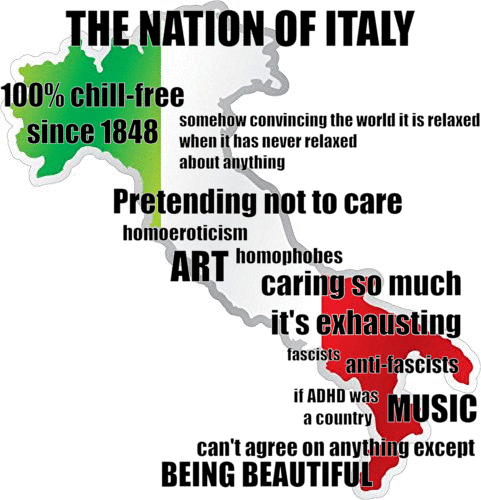
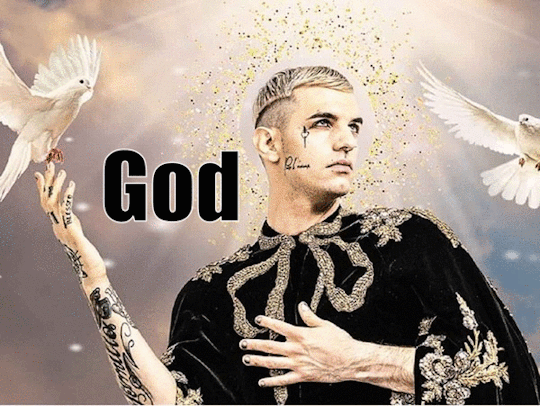
AKA: host Amadeus, entertainer and comedian Rosario Fiorello, il Bel Paese, and competitor Achille Lauro.
Amadeus got things off to a bad start before the show even began by praising his various female co-hosts - all seasoned TV professionals - for their beauty and their ability to stay “a step behind a man.” Outrage ensues, Amadeus claims he did not mean it like that, but keep this in mind for later. Also competing are Morgan (below, left) and Bugo (below, right.), who are performing a duet.
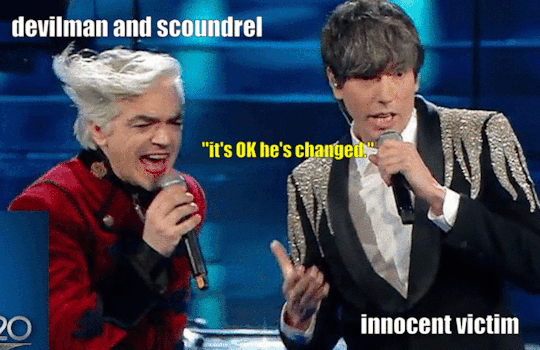
Going in, the one thing I know about Morgan is that on more than one occasion, he trashtalked my beloved and blameless Fabrizio Moro. So I hate him and want him to suffer. And apparently he has quite the reputation for throwing tantrums, picking on fellow-artists and sabotaging events he’s part of. But hey. He’s supposedly talented and Bugo clearly thinks he deserves another chance. And we’re off!
Irene Grandi kicks things off with “Finalmente Io” (“Finally Me”). But I’m starting with her not so much because she’s the first to sing as because I don’t think the song’s got enough attention -- either for the fact that it bangs or for what it represents in the drama that’s about to unfold.
Finalmente Io is what, in the business, we call foreshadowing.

There’s a magical thing that happens to women with when they turn 40. The develop Not-Giving-A-Fuck superpowers. The song is basically about that. It’s about freedom, and self-acceptance, and being 100% done with male bullshit. (It's also a bit of an ADHD anthem but let’s leave that aside for now.) “I’ve lost all my patience, and all my fragility,” she sings.
And, “If you want sex, let’s do it now. Heeeeeeere.”
Irene is the portent everyone misses, a harbinger of what is to come.
Think of her as John the Baptist. Onwards. So the first thing one discovers about the Sanremo Festival is that just because we have to get through 24 “big” acts AND 6 (?) new/junior artists, and they all have to perform multiple times, that doesn’t mean there’s any RUSH. Guest singers wander on and perform a song or ten. There’s comedy. We can stop everything to talk about football. A lady comes on and talks for a million years about how her granny taught her that True Beauty is Found Within. There are also speeches about important subjects like violence against women. In fact, we are going to talk about that a lot, but also a bunch of competent and experienced female TV personalities are stuck taking turns at playing Amadeus’s Glamorous Assistant of the evening and he can’t shut up about how beautiful they all are while they cringe and lean subtly away from him. So it’s ... slow, and awkward, but within its own cheesy terms, things are normal. Too normal. Enter Achille Lauro.
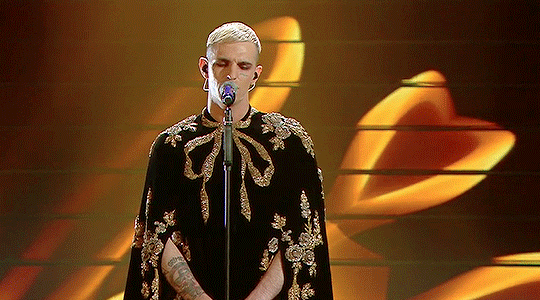
Softly, almost whispering, he begins to sing a song called “Me ne frego” (”I don’t care” - but with an edge of “fuck you”). This is both an everyday Italian expression and a fascist motto. Well, it was till now.

A nation is convulsed. Right-wing Italian boomers are screaming because YOU! CAN’T! DO! THAT! AT! SANREMO! THERE! ARE! CHILDREN! WATCHING! Italian Tumblr, which like the rest of Tumblr is feral, thirsty and gay, is screaming for different reasons entirely.
Achille, you scandalous creature, what have you done? What have you got to say for yourself?
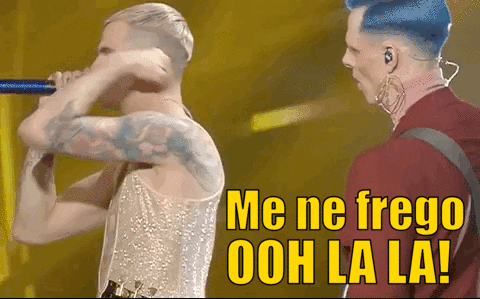
Something strange and magical has released and it cannot be contained. On with the songs. Good songs, bad songs, blah songs. I like “Tikibombom” by Levante - a love letter to weirdos and rebels, “Rosso di Rabbia” (Rage Red) by Anastasio about being, well, angry but scared you can’t do anything useful with it, and “Eden” by Rancore, about... the nature of sin?? touching on everything from September 11 to the mafia to Snow White and the Seven Dwarfs. However, this contest is being judged (mostly - it’s complicated) by an industry jury of FOOLS, COWARDS, and TRAITORS who KNOW NOT WHAT THEY DO, so virtually all of the above artists are so far languishing towards the bottom of the provisional rankings. Achille ends up in 17th place and Rancore at 22.
Truly, the light hath shone in the darkness and the darkness knoweth it not.

LOOK WHAT YOU’VE DONE TO RANCORE.
Rapper down, repeat RAPPER DOWN. SEND HELP.
However, for people who went in implacably biased against Morgan, it’s not all bad news. "Sincero” (Sincere) by Morgan and Bugo is in last place. Whether this is anything to do with the song or because Morgan is a nightmare of a person who has systematically alienated everyone in the Italian music industry except the trusting Bugo ... we can but ponder. Sanremo grinds on. Days blur into each other and I’m not even going to try to cover events in exact order. Sanremo knows no order. Sanremo is like the universe, linear time is a construct that doesn’t really exist, and chaos happens very, very slowly. But meanwhile, somewhere on the astral plane:
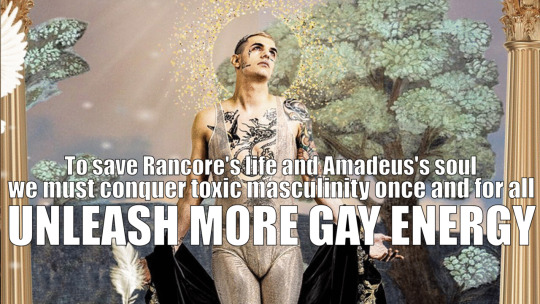
At least that is what I deduce must have happened.
The competitors and guests look deep within themselves. Do they have what it takes? Are they ready to answer the call?
Let’s see! It’s Covers Night! Which is also Duets Night!
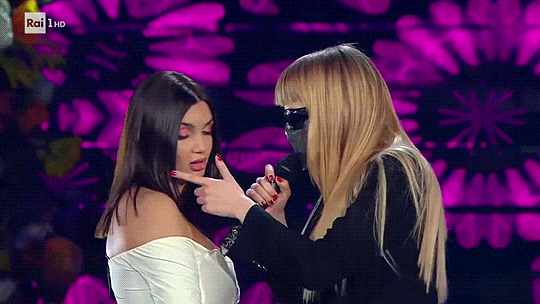
That’s Elettra Lamborghini (yes, that Lamborghini) and Myss Keta.
Are they in tune? No. Does it matter? ALSO NO.
Meanwhile ... something strange is brewing between Amadeus and Fiorello...

But wait, PLOT TWIST.
Enter Roberto Benigni.
The beloved actor and director is the latest avatar of the Dionysian frenzy that has chosen Sanremo 2020 for the place of its birth. He is the One who will unite the electric queer mayhem and the impossible grinding tedium of Sanremo. In him, the two strains will fuse and become unstoppable. He is going to talk about sex for twenty-six minutes

He reads from the Song of Songs, which ... I knew it was sexy, and all, but is it really like that? Do you ever think about NAKED BODIES? Roberto does. Do you believe in PHYSICAL LOVE? Roberto wishes you would. Anyway, just think of all the sex we could all be having, literally right now, right heeeeere, whether we are “a woman, and her man. Or a man and his man. Or a woman, and her woman!” He is awful. He is magnificent. He is excruciating. He is spellbinding. We are hanging on his every word and we are considering chewing our own arms off to escape. He proposes an orgy in the orchestra pit.
Hand on heart, all of that happened. Italian Tumblr, bear witness.
And what of Achille Lauro? He unleashed this madness upon us all, is he just going to sit back and let everyone else do all the work? Of course not. Achille Lauro came to bring not peace, but a sword, to the world of toxic masculinity and gender in general and his work is not yet done.

”I too was once a little girl,” Achille sings.
Dressed as Bowie-as-Ziggy, Achille duets with Annalisa on “Gli Uomini Non Cambiano” - “Men Don’t Change”. It’s a heartbreaking song by Mia Martini from 1992 about male abuse of women, and not a single word, or a single pronoun has been changed.
However, although he’s the one in the competition, and the one dressed to dazzle, he leaves Annalisa the spotlight. It’s like she’s the tortured protagonist of the song and he’s a voice in her head, a sympathetic spirit who can’t swoop in to rescue her but can quietly affirm that she deserves better than the the hellish treatment she’s singing about. in fact, he pointedly stays a step behind her at all times. And she’s majestic.
Of course, he’s not fucking DONE
He’s still got to sing “Me Ne Frego” again. Can he top the cape-drop? You be the judge.
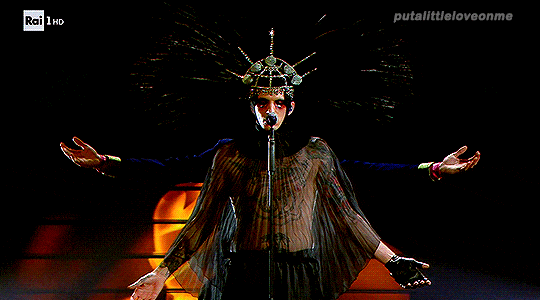

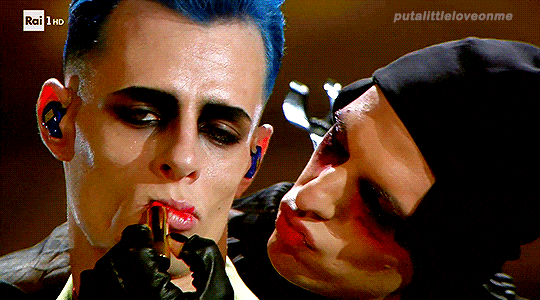
So Italian Tumblr, is now writhing on the carpet, making a sound only bats can hear, and shitposting itself into delirium, but has it all been ENOUGH?

NO.
Poor Rancore has died again. Toxic masculinity still exists. Amadeus is still pretty gross. Everyone is going to have to GAY HARDER. CAN THEY DO IT? This post is, like Sanremo itself, getting insanely long, so ... STAY TUNED FOR PART TWO, in which Fiorello’s true nature as a chaos being is revealed, Amadeus faces his Calvary, and the gun on the stage goes off. ----- UPDATE: Part 2 is here
1K notes
·
View notes
Text
My OCs Masterpost - Hawke Edition
Here is a brief introduction to my OC Hawkes!

Name: Katheryne “Kitty” Marian Hawke
Worldstate: Worldstate 1 & 2
Age: 24 in 9:31 (born on August 2nd, 9:07 Dragon)
Species/Race: human
Class/Specialization: mage/spirit healer/elemental
Height: 5’8
Gender/sexuality: bi/woman
Romance: Fenris
Characteristics/personality: Purple-leaning; charismatic, self-critical, sarcastic, fiercely protective, impulsive, reckless, story hungry, ambivert, optimistic, rambling talker, empathetic, physically affectionate, a worrier
Hair: short messy straight black hair
Eyes: blue
Distinguishing features: various scars, notably a long one across her back from when she fell from a tree when she was little; a few tattoos
Hobbies: gardening, exploring, finding stories, helping her friends, dancing
Brief Background: The family lived in Denerim, until Kitty was 7 years old and came into her magic. Worried about the templars discovering them, they moved further inland to just outside Lothering. There they worked the land and trained in secret, she learned to love gardening and growing things. Kitty was always closer to her father than her mother, following after him wherever he went. Hearing about his earlier adventures, Hawke was all set to see the world, but then tragedy struck when she was 20 years old, a day after her birthday, as her father died, suddenly. She got the nickname Kitty from Bethany and once they got to Kirkwall, she went by Hawke, because it hurt to hear the name.
Family: Malcolm Hawke (father-deceased 9:27 Dragon), Leandra Amell Hawke (mother – deceased 9:34 Dragon), Bethany Hawke (sister – deceased 9:30 Dragon), and Carver Hawke (Grey Warden), Gamlen Amell (uncle), Charade (cousin), Asher Amell (cousin). But let’s be real, the Kirkwall Crew is also her family. Later, she has two kids with Fenris, Mal and Diana.
Random Notes: Mabari named Babs (Babbler); talks with her hands; had to work hard for her magic, it didn’t come easy to here like it did Bethany; loves raspberries; bonded with a spirit of Hope; main love languages are physical touch and acts of service; infectious impish laugh; favorite season is Spring; lithe and leggy; always finds mischief
Art by @pegaeae and @gewska.

Name: Garrett Lysander Hawke
Worldstate: Worldstate 3
Age: 24 in 9:31 (born on August 2nd, 9:07 Dragon)
Species/Race: human
Class/Specialization: mage/force mage/fire focus
Height: 6’4
Gender/sexuality: gay/man
Romance: Anders
Characteristics/personality: Blue-leaning; cheerful, optimistic, a puppy dog of a human being, reckless, a sweet man who can’t say no, naïve, trusting to a fault, extrovert; strangely insightful for someone who is seemingly clueless; hates conflict
Hair: black hair kept shaggy and a (sometimes) trimmed beard
Eyes: golden amber
Distinguishing features: many scars; strong nose and jaw
Hobbies: talking to people, helping people, baking, getting into trouble by accident, running
Brief Background: Naturally talented in magic, an overpowered force mage who can’t really do small magic. He is a happy-go-lucky guy with more wisdom than intelligence, his father or his siblings keeping him from being conned. He ended up in the protector role in his family less because he is a leader (he really isn’t), but because of his abilities. He wants to take care of everyone and make sure they are happy, whether they are family or friends. He volunteers to help people in the Alienage and in the clinic, though he usually lifts things or entertains kids, instead of using magic.
Family: Malcolm Hawke (father-deceased 9:27 Dragon), Leandra Amell Hawke (mother – deceased 9:34 Dragon), Bethany Hawke (sister – deceased 9:30 Dragon), and Carver Hawke (Grey Warden), Gamlen Amell (uncle), Charade (cousin), Asher Amell (cousin).
Random Notes: Mabari is named Mabs (short for Mabel); has read (1) book; main love language is words of affirmation; jock mage (muscular, but soft); has trouble staying still for any length of time; loves sweets; cannot hold his alcohol; forgives easily; misquotes the Chant of Light (he tries); loves puns and dad jokes; boisterous full laugh

Name: Corva Rose Hawke
Worldstate: Worldstate 4
Age: 24 in 9:31 (born in 9:07 Dragon)
Species/Race: human
Class/Specialization: rogue/bow
Height: 5’0
Gender/sexuality: woman/lesbian
Romance: Isabela
Characteristics/personality: Red-leaning, bitter, fiercely and ruthlessly protective of her family and friends, blind to faults of those she loves, biting wit and sarcasm, shoot first and ask questions later, blind rage at injustice, judgmental, introvert, creative, competitive
Hair: long blond hair, like her mother
Eyes: one amber, one blue
Distinguishing features: several tattoos, freckles across her face
Hobbies: drawing, tattooing, archery, collecting flowers, drinking
Brief Background: A sweet child, no one who knew her then would guess that she is the woman she is today. When the family had to move for the fourth time to Lothering, to avoid the notice of templars, Corva was 12 and angry at the Chantry for forcing them to this life. She grew angrier and more bitter as the years went on, after the death of her father, she got in a fist fight with a local templar, Carver stopped her from killing him.
Family: Malcolm Hawke (father-deceased 9:27 Dragon), Leandra Amell Hawke (mother – deceased 9:34 Dragon), Bethany Hawke (sister – circle mage), and Carver Hawke (brother – deceased 9:30 dragon), Gamlen Amell (uncle), Charade (cousin), Asher Amell (cousin)
Random Notes: Mabari is named Baby Blue; was set to storm the Gallows when her sister was taken – only her mother intervening stopped her; not a touchy-feely person; main love language is acts of service; 180 pounds of muscle and padded curves; words are hard (when they need to mean something), action is easier; barking bright laugh

Name: Beau Constantine Hawke
Worldstate: Worldstate 5
Age: 24 in 9:31 (born in 9:07 Dragon)
Species/Race: human
Class/Specialization: mage/blood mage
Height: 5’10
Gender/sexuality: non-binary/bi (they/them)
Romance: Merrill
Characteristics/personality: mostly blue, sweet, charming, cautious, nosy, skittish, clumsy, a good listener, a private person, ambivert, questioning, they live in their head a lot, observant; when push-comes-to-shove, has an iron resolve
Hair: thick coiled red hair
Eyes: amber brown
Distinguishing features: so many little scars
Hobbies: painting, organizing, journaling, people watching, playing games/solving puzzles
Brief Background: A timid child, they were always sneaking and looking, finding things about people in the village they had no reason to know. No one could stay mad at them long, they just had that way about them. Although, it takes people a long time to actually get to know them, they keep everything close. They are fascinated by magic and the fade, never learning to fear it.
Family: Malcolm Hawke (father-deceased 9:27 Dragon), Leandra Amell Hawke (mother – deceased 9:34 Dragon), Bethany Hawke (sister – deceased 9:30 Dragon), and Carver Hawke (brother – deceased 9:32 Dragon), Gamlen Amell (uncle), Charade (cousin), Asher Amell (cousin).
Random Notes: Mabari is named Killjoy; main love language is quality time; loves fancy cheese and breads; 250 pounds of love and squishy curves; loves sunshine and the summer; a quiet leader and eloquent speaker; cheats as well as Isabela and Varric at cards; Snorts when they laugh
Link to my OC Masterpost: Grey Warden Edition!
#dragon age#dragon age 2#Hawke#MY OCs#Kitty Hawke#Garrett Hawke#Corva Hawke#Beau Hawke#da2#custom hawke#my oc: Garrett Hawke
10 notes
·
View notes
Text


Saturday Magickal Correspondences
Planet: Saturn
Element: Earth, Fire
Gender: Female
Deities: Cronos, Fates, Hecate, Loki, Saturn
Colors: Purple, Black, Maroon, Dark Colors, Indigo
Metals: Lead
Crystals: Apache Tear, Black Onyx, Coal, Coral, Hematite, Jet, Lead, Obsidian, Pewter, Salt, Serpentine, Smoky Quartz, Tourmaline,
Herbs & Plants: Amaranth, Beet, Belladonna, Boneset, Comfrey, Cypress, Hellebore, Hemlock, Hemp, Ivy, Mimosa, Morning Glory, Mullein, Quince, Skullcap, Slippery Elm, Thyme, Moonwar
Aroma & Incenses: Cypress, Myrrh, Patchouli, Saturn Oil
Energies & Associations: Agriculture, Apprehension, Banishment, Binding, Boundaries, Caution, Cleansing, Creativity, Cursing, Destruction of All that Does Not Serve, Elderly Care, Endings, Exorcism, Fortune, Freedom, Hexing, Hidden Matters, Hope, Limitations, Locating Lost Items or People, Longevity, Meditation, Overcoming Obstacles, Protection, Psychic Defense, Revealing Truth, Self-Discipline, Spiritual Communication, Spirituality, Wisdom
Saturday Ruled by Saturn – This is the day for attuning your psychic and third eye abilities. Learn to be self-disciplined. This is also a day to help people who are ill, or near end-of-life. Either healing those who care for the sick, or giving peace to those who are sick and injured. This is also a day to help with mental health issues. This can be a challenging day for facing fears. Binding, cursing and repelling work is popular this day, so if you have a score to settle, get to it.
Saturday (Saturn)
The final day of the week is ruled by Saturn, lord of endings. Saturn has a reputation as an inauspicious day for magick--but of course, it depends on the type of magick. There is no better day for spells of binding and banishing. Saturday is also a good day for Underworld magick, communing with ancestors and contacting spirits. (The Key of Solomon specifies that Saturday is the day of spirits who died a natural death--those who died heroically should be honored on Tuesday.) The energy of Saturn helps to cultivate patience and wisdom. Recover from grief. Overcome addictions. Cast protective wards. Sever unhealthy bonds. Visit elders or reflect on the past.
Saturday, Any planning of future projects and matters to do with the home, personal relationships, or personal goals can work with the contained energy of Saturday, it is also a day of kicking useless or bad habits, and bringing to an end anything that isn’t working in your life. This day is ruled by the planet Saturn.
Additionally to word it differently: Saturday is the best time to deal with such matters as: Binding, Patience, Stability, Neutralization, Material Gain, Protection, Karma, Death, Manifestation, Structure’s, Reality, Laws of society, Limits, Obstacles, Tests, Handwork, Real Estate, Dentists, Bones, Teeth, Farm Workers, Sacrifice, Separation, Stalkers, Murderers, Criminals, Civil Servants, Justice, Math’s, Plumbing, Joint Money Matters, Wills, Debts, Financing, Real Estate, Discoveries, Transformation and Relations with Older People.
Saturday Candle & Oil: Saturday is Saturn's day, and it is the day for intentions regarding a major change in your life. It's also a great day for those looking to pursue psychic wisdom, particularly in the realm of spirit communication. Affirmations for locating lost things should be done on Saturdays. This should be accentuated by burning either a gray, black, blue, or purple candle. Anoint candles with sandalwood or frankincense oil.
Saturday: This day of the week got it’s name from the god of karma and time, Saturn. This day is obviously associated with the planet Saturn and is our last day of the week. Traditionally Saturdays are great days for protection, banishing a negative situation, and generally a good time to clean up any magical messes that you have been ignoring. Some suggestions for Saturday enchantments would include:
* Wearing the colors of the day, black and deep purple. Here’s your perfect excuse to be dramatic and witchy. Empower these dramatic pieces of your wardrobe for protection and strength.
* Burning black candles to absorb negativity and burning purple ones to increase your magical wisdom and boost your spirituality
* Adding a touch of garden witchery to your Saturday spells by working with the pansy (in black or purple of course), the morning glory flowering vine, or the cypress tree.
* Carrying an obsidian, hematite, or jet tumbled stone in your pocket to reinforce your personal protection and to ward off bad vibes and sour feelings. You can also add these crystals to a candle spell on a Saturday night to really increase the punch of your spellcasting.
* Cleaning your house and cleansing it while you are at it. Tap into those obstacle-removing vibes and the positive, concluding energies.
* Closing up the final day of the bewitching week with a bang by calling on Hecate for protection and guidance.
Every day is a Magical day. Just how Enchanting of a day it turns out to be is your decision and Intent.
29 notes
·
View notes
Text
Present: A Ritual for Queer Shame
This is a ritual for queer shame. I invite you to read through this with me and try it, even if you don’t think of yourself as someone that does magic. Try it with me as a thought experiment.
Let’s start by considering the possibility that ritual can change you. I don’t mean this to say that it can be a substitute for doing work on yourself, or for having a varied and flexible mental health toolbox, but rather that we are frequently prevented from doing work that we need to do by the fear that it will be intolerably painful, and that working collectively in practices that give us structure to hold that pain makes it easier to face, thereby making that work more accessible. This type of ritual (which can also be called katharsis) doesn’t clean out your basement for you, but it can break open the rusted-over lock on the door to the stairs, which will give you access to get down there and clean it out yourself. We can call this ritual “magic,” but we don’t have to. I’m less invested in the vocabulary than I am in the syntax, and all the roads up a mountain lead to the top.
So if the language of “magic” works well for you, we can use that. If you’d prefer to consider this an exercise in psychological and somatic processing using tools drawn from the work of Eugene Gendlin, Starhawk, Halko Weiss, and Bessel Van Der Kolk, that’s also fine. The important thing is that you try this with a sense of curiosity and openness to the possibility that it’s not meaningless.
Let’s start by letting go of the moments we have made it through to get here. Each you that you have been in each moment up until this one, every younger and smaller self lingers in your body. Their pains are your pain, but let’s start by letting there be a little bit of distance between you and them. Every time you breathe in, feel the space between the you that you are now and all of those past selves. It’s not a violent severing, it’s not a space of uncaring, it’s just enough distance that you can really see them and hear what they’re saying instead of being overwhelmed by the volume. Every time you breathe out, let those past selves feel your breath like a warm breeze in the spring, let them take in the information that they aren’t alone, that they are witnessed, that they are held. Stay with this breath for a little while, let it open some space up inside you and clear off any debris that’s accumulated in or on you.
Now let’s turn our attention to the present moment. This is the part where you really let yourself remember that you are an animal, that the substance of you is breath and blood, that the mechanisms by which you take in information about the world are ancient. Feel the boundaries of your body, your skin where it touches the air, your nerves thirsting for information. Feel gravity pulling you down to the earth and the earth below you bearing you up. Feel your breath fill you up and your body push it out, the eternal rhythm of your heart, the way the energy flows smoothly into and around the boundaries of what you understand to be yourself. This is a kind of being alive and being real that cannot be taken away from you.
This kind of base aliveness is also a way of being connected. The way your heart moves the blood through your system, the way your breath fills you, the way your nerve endings sparkle against the air — these are things you share with your ancestors, with your living families, and with your descendants. The family that is the lineage of queerness and gender nonconformity stretches outward from you in all directions, in all dimensions. Everywhere you look, wherever you stretch out your hand, they are there reaching back for you. Keep feeling the workings of your body as one of an infinite number of nodes in a web of connection and care as expansive as eternity.
Let’s also call in whatever other powers you feel have your back. This could be the lineage of the ancestors of your blood, your helping spirits, your god or gods, your own powers — whatever face you see when you picture the knowledge that you are not alone, that you are protected. Whoever they are, whatever form they take, let’s take a moment to feel their presence, to feel into the connections between you and them, and to breathe into the knowledge that when you stumble, they’ll be there. Let’s invoke those spirits, and call their protection and guidance into the space that we’re creating together. Hail and welcome.
Stay with these ideas until you can feel power singing along these connections to ground you and plant your roots firmly in the moment that your body exists in right now. Take your time with it. This is process-oriented, not goal-oriented. Getting through it faster isn’t better.
When you’re ready to move to the next step, let’s start to build a memory of pleasure. It doesn’t need to be a narrative memory, but rather more like a collage of sensations and emotions. What was the last joy you felt? What’s a sensation in your body you can remember that reminded you that being alive is pretty cool? What moments have affirmed the immanence of your body and the capacity of your spirit for wildness? What has given you a respite from anxiety, hyper-rationalization, dissociation, fear — even if just for a second? Hold those moments gently, as if you’re guiding soap bubbles together to make one larger bubble. Let them resonate in you as if you were a bell. Feel the harmonics of them in different parts of your body, let them sink into your bones. Let the different parts of it catch the light. This immanence is always available to you. This is yours. This is for you. You get to keep it.
Is there anything in you that’s standing as an obstacle between you and this feeling? Something that’s telling you that it’s not for you, that you’re not allowed, that it’s too much, that you don’t deserve it? Step back from this obstacle. Look at it. Feel the boundaries of it. Where does it live in your body? What surrounds it? What’s the sensation of it? Are there words associated with it? What does it say?
Let’s name this obstacle “shame.” This obstacle was given to us by institutions of control and has been being given to us our whole lives. It made its home inside us to protect us from being punished by those institutions. This shame is doing everything it can to protect the vulnerable places in us from harm, and for this work, we are grateful.
Let’s take a moment and open up a little room for what this shame is protecting us from. Being present is terrifying. It’s dangerous. It puts you at risk of deeply connecting with others, of seeing them and being seen in the fullness of yourself, of being rejected — or even worse, of not being rejected. Shame protects us from having to ask the question: am I really worthy of love exactly as I am now?
But let’s imagine, just for a moment, what it might be like if we could release this protection. If we could accept the fear, step into and through it, and choose freely to be present. Let’s imagine that moment just one heartbeat into our shared future.
Let’s imagine one heartbeat ahead into a moment where we can release this shame. A moment where there is no block or barrier between us and truly, fully, unabashedly feeling, being present in, digesting, integrating — our pleasure, our power, our connections. Let’s look into this moment where our shame is allowed to dissipate like a little twist of pollen in the breeze, and where in its place, our helping spirits, our ancestors and descendants, our families, stepped up to fill the space, to hold and protect us, to keep institutions of control at bay and open us up a space of liberation.
Let’s imagine this moment before us, where each joy we encounter, each beautiful sensation, each moment of bodily immanence, can surround us and fill us without any barrier, can stay with us, can live in our bodies and be available to us whenever we want to return to them. Do you have that moment fully realized in your mind? Can you feel it trembling on the cusp of this one? Can you feel what your body will feel like in that moment? Your senses in that moment? Your heart in that moment?
In just a moment, we’re going to take a step forward together. It can be a physical step or not — do it however makes sense for you, with your body, with how you’re engaging with this. And as we step forward together we’ll step into that moment, let it come into being through us, let it bloom inside us and be real. This is yours. This is for you. You get to keep it.
As we step forward together, let the shame inside you soften and melt and gently fall away. You don’t need it to protect you anymore. Let it flow out of you. You can shake or dance or cry or sing or howl it away, whatever you need to do to scrape the last little shreds of it out of your spirit. All your spirits, ancestors, everyone we’ve called into support and guide you, they can help you.
As you pass through the membrane from that world into this one, give a moment of gentleness to what you are leaving behind. You can speak to it as you let it go — name it, thank it, say goodbye to it or hello to what you are becoming. Take all the time you need to feel the transition, to let it move through you and wash over you.
When you are ready to be done, let’s say goodbye to the elements, entities, spirits you called in, thank them for their protection and guidance. Gratitude and love for the ancestors who walk with us, who laid the path we tread, whose light shines our way. Gratitude and loves to the descendants of our lines, those whose ancestors we are, those bright faces that keep us hoping and fighting and surviving so that they may bloom without ever feeling the shame we have been taught. Gratitude and love to the spirits, the elements, everything that held us together in this moment.
And know that when we go out of this shared moment, back out into the rest of the world, we go out with this moment of abundance and liberation alive within us. The energy we have raised goes with you. The step forward you have taken goes with you. The presence you have cultivated tonight can never be taken away. It’s yours. It’s for you. You get to keep it.
16 notes
·
View notes
Text
The Sacred Sea, February's Witches Moon Box

This box is all about the healing and protective qualities of the Sacred Sea and getting intune with Oceanic Energy.
Let's start with the monthly items; herbs, sacred salt, anointing oil, incense, stone/crystal, spell candle and BOS artwork.

Herbs
Lemon Balm Herb. Gender: Feminine Planet: Moon Element: water
This herb was used by Beekeepers in the Temple of Artemis to keep honeybees content. These plants promoted a sense of homeliness for them so they stay within their hives and nurture the relationships within their community. This intention is still used, for Magickal ritual, to promote a sense of Friendship, Love and Well-Being within our homes. Can be sprinkled around the outside of your home or used in sachets to share with friends and loved ones.
Chamomile Herb. Gender: Masculine Planet: Sun Element: Water Magickal Attributes: Love, Money, Purification, Protection
Chamomile has been used in incense to clear and cleanse our Sacred Space. Can also be used in sachets and charms to dispel curses and spells cast against you. As well as placed inside of your tub during bath rituals to attract love.
Watercress Herb.
An elemental herb, it has been a sacred symbol of the Undines, bringing forth profound visions and enlightenment. A perfect herb to enchant candles by being pushed or placed upon the wax so you may have a stronger connection to your visualizations during Ritual or Meditation.
Sacred Salt
Water. Enchanted with: Avocado, Lavender, Rosemary and Sandalwood Oils, Watercress and Lemon Balm Herb + 'Water' Magickal Oil
To provide Healing, Cleansing and Loving energy. As this sacred salt relieves you of self-doubt and negative self thoughts, it begins to fill your spirit with the essence of Friendship and Compassion.
Anointing Oil
Yemaya. Enchanted with: Avocado, Lavender and Rosemary Oils, Papaya, Ground Sage and Spearmint Herbs, Lemurian Quartz + 'Song of the Sea' Magickal Oil.
Created with a full and vibrant heart, to charge you with the beauty of Love and Compassion. It acts as a magnet to those things that we desperately need to enhance our lives and practice.
As a Mother Goddess, Yemaya is fiercely protective of all of her children, the fortunate and the disenfranchised. She cares deeply for all people, providing comfort during times of intense sorrow or hardship. She oversees the practice of Grace, Love and Forgiveness, Health, Healing and Ancient Wisdom. The African Diaspora, directly resulting from the violent Trans-Atlantic slave trade, transformed the Yoruban Yemaya into a highly syncretized 'Mother of All'. She is a constant champion, working tirelessly to inspire us to be our best selves. Regal and Distinguished, the elegance of Yemaya resides in her non-judgmental, compassionate nature
Incense
Realization.
To provide you with perspective.
Stone/Crystal
Rough Howlite. Affirmation: I am one with the intentions and visualizations I portray. I capture the true essence of wisdom provided to me from dreams and connections to the Divine.
An 'attunement' stone, it provides us with the ability to connect more deeply with our visualizations, allowing us to bring back enlightenment and wisdom. As the sea may be far for some, this stone allows you to strengthen your connection to its powerful force. It can be used in meditations in which you wish to dispel restless and unwanted emotions and energies.
Spell Candle
Watchers of the Sea. Enchanted with: Lavender and Rosemary Oils + 'Yemaya' and 'Water' Magickal Oil.
To provide and offering to the Great Ocean. As we focus on receiving Protection, Wisdom and Healing from the Mother of the Sea, we cast our gratitude to her.
BOS Artwork
Yemaya and The Magical Shell
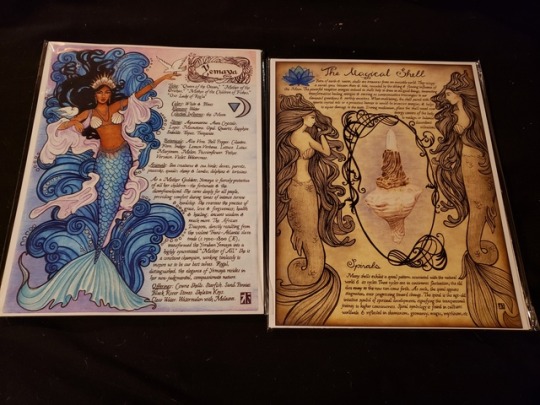
Now for the Specialty items
The Sacred Sea Healing and Protection Sigil
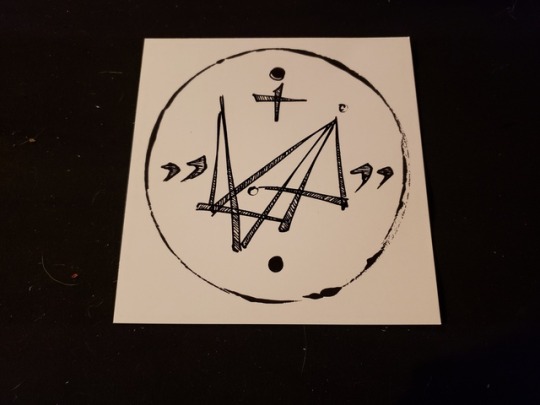
This sigil has been created for you to place in an are where you feel you need Protection and Healing the most. It also holds with it the power to connect you to the transformative powers of the Sacred Sea
Affirmation/Mantra: I hold within me and without, the protection and healing power of the Great Mother Goddess. I am surrounded by Compassion and Beauty.
Sand Dollar Offering

The sand dollar has been a representation of Good Will and Peace in many cultures and religions. Provide it as an offering during your rituals and meditations. As you place it upon your alter, whisper a blessing of gratitude.
Hand-Crafted Shell Wand with Quartz Point
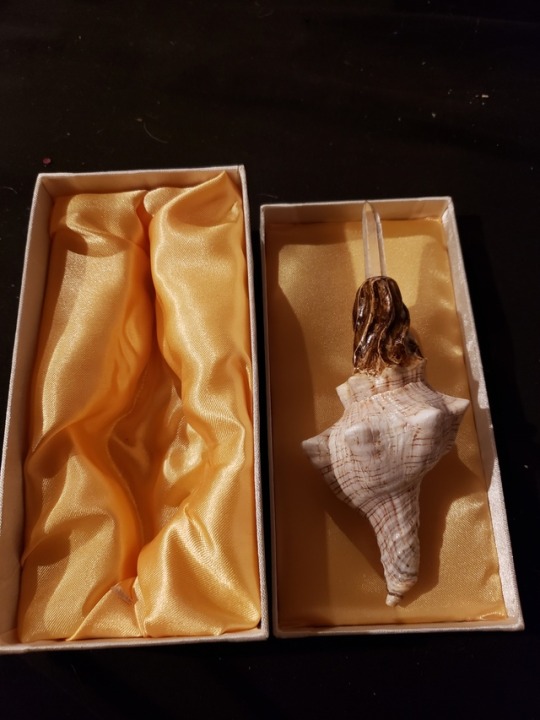

Inspired by the mystical power brought upon the shore as a sacred offering and gift from the Divine. During meditation, place it over energy centers of the body to realign or balance discordant vibrations. Along with these energies, the Spiral formation is significant to our Sacred Space. A symbol of Spiritual Development and Rebirth, this ancient form has shared wisdom throughout the ages. As the cycles shown in this spiral continue to form, the bring assurance that our journey also continues to grow and change. While we work towards breaking through barriers in our personal, professional, spiritual and emotional growth, we remember that is it necessary to move forward, as is the natural order.
Born of Earth and Water, shells are treasures from an invisible world. They occupy a Sacred Space between shore and tide, revealed by the ebbing and glowing influence of the Moon. The powerful receptive energies imbued in shells help to draw in all good things, emanating transformative healing energies, an serving as communicative messengers to our elemental guardians and earthly ancestors. When meditating, the shell paired with the quartz crystal acts as a protective barrier to would-be invasive energies, helping to repair damage to the aura.
This box was definitely full of some beautiful items and I am very happy to have them. The wand alone feels so powerful and i fell calm when it is in my hands.
#pagan#paganism#witchcraft#wicca#witch#magick#wiccan#witchery#magic#herbs#incense#the witches moon#sacred salt#witchy#anointing oil#magical#magickal#stones#wand#shell#sacred sea
2 notes
·
View notes
Text
Misdiagnosing Anti-Psychiatry
The misunderstanding and misinterpretation of anti-psychiatry as a movement involves a fundamental act of reclamation by neoliberal opposition: the opposition of psychiatric acts as realized in one fashion or another by neoliberal structures of reckoning is part of a larger apparatus of control, is the dissolution of the Asylum in a kind of Reaganite echo, the insistence upon a concept of the body and the mind as reduced to Cartesian objects of commodification, and itself prone to evoking a response that is not in any way meaningfully in favor of critique of psychiatric violence, hierarchy, the restructuring of the asylum in the school, the prison, the police as armed healthcare providers, but merely an act of creating difference in the exact character of justification, of an individualizing account of “neurodivergence” far more for parents and police than for patients.
The opposition that is contained within “anti” as a kind of signifier of mere opposition, rather than the fuller act of engagement implied by its use in a title like Anti-Oedipus is part of the vital semiotic act of describing anti-psychiatry as populated by the same sorts of ideologues who reject vaccines out of a belief that they cause autism, which itself relies on not rejecting structures of medical establishment, but in fact copying them, renaming and resignifying them, acting out of the same epistemic framework. Frequently, an “autism epidemic” is used to discuss the way in which autism is seeing an increase in diagnosis, and this same structure is often gendered, with the understanding that there is a task to “bring back” boys from a shell of autistic unreality and birth them into a new life as a post-autistic individual, one able to think and moreover display those thoughts in an acceptable fashion, with acceptable opinions not only on their neurotype but a continual display of that neurotype, a performative gendering of their body as one that can continue to act as a machine of Oedipal filiation, the reflection of Oedipus in one’s children creating the nexus of filial affinity. These processes neglect to mention that it is in aesthetic, rather than epistemic, mimicry that this approach originates, and that a more meaningful analysis (even a psychoanalytic one) sees the notion of having an autistic child as itself a traumatic experience for a parent, a trauma that fundamentally changes how a parent views themselves and their child, an Oedipal trauma of the highest order induced by capitalist structures of performativity and producing-production implied in the role of parentage. The “loss” of boys to Autism is in fact not any such occurrence, but a result of coercive acts of sexing and gendering the body: the body is first sexed, and then given certain possibilities of embodiment as a result, cultivated and nurtured in certain fashions, expected to respond in kind, and the structures of response at hand lead much more readily to the diagnosis of autism in boys than in girls. There is not a problem of increased prevalence of autism in boys, but its lack of abundance for girls. The means by which psychiatric study so often concentrates on expanding and creating new potentiality for boys while neglecting the same for girls is a foundational aspect of the kind of violence it creates, the sort of violence that psychiatry relies on. Being anti-psychiatry is thus not being against attempts to care for or mitigate harmful symptoms, but rather critiquing the ways in which diagnoses are used to striate and collapse the body into sexed and gendered and racialized and class-based subjectivities.
The restructuring of schizophrenia and schizophrenic experience is akin to deconstruction in that schizoanalysis represents a process of fleeing, of upturning, of radiance and restructuring, deterritorializing, new signifiers of meaning and difference along with new lines-of-flight becoming more apparent specifically due to the opposition between previous modalities of relating and the ones proposed by schizophrenic potential. The hallucinatory, the psychotic, the immaterial is signified within schizophrenic experience specifically because these structures of dismissal form fundamental aspects of phenomenal experience, the phantasmic differentiation of the material, experiences of ecstasy and psychedelic glee that cannot be ignored, are not ignored by Deleuze and Guattari. Inducing these experiences through drug use is a common means of expanding thought processes, is taken as a kind of naughty breaking of taboo in the same way that college-aged lesbianism is, fetishized but ultimately expected to sublimate into its reflection in heteronormative structures of desire, normative ideation of the body and the brain as well as the subjectivity embodied within. The body does not produce these experiences, cannot understand phantasmic structures of difference; instead, they are ascribed to external delusions as a means of experiencing the world. Delusion is a strictly negative term, one that can be ironically reversed but only with the retention of its semiotic load, positing unrealness as lacking any genuine quality, as a false and unreliable sort of experience. One must, then, be “sane” enough to recognize the hallucinatory, and can only then relay the expansion of the body at hand. Schizoanalysis as deconstruction, deterritorialization, lies specifically in the rejection of these codifying norms and instead a kind of acceptance of sign, signifier, signified, simulation and simulacra as equal in their semiotic content, in the free association of semiotically similar expressions, the process of moving from one to another as not toward any end, but itself a producing-production in need of exploration. Anti-psychiatry can certainly mean helping schizophrenic people live lives where they can willingly differentiate between certain orders of signification that are meaningful to them, but it is in providing an epistemic framework for these orders of signification that psychiatry begins to impose structures of violence. These structures are dedicated to the producing of a productive worker or a sufficiently innocuous subject, rather than allowing for schizophrenic understandings of experience to inform those around them. The potential for an expansion and development of signifying structures to the phantasmic is a vital part of schizoanalysis and the structure of schizophrenia.
Comparisons between surveys of individuals diagnosed with schizophrenia, or with autism, that compare cultural concepts are important specifically because they provide a sort of insight into the violent codification of selfhood and experience that psychiatry provides, seeks to provide. The experience of “hearing voices” is highly contingent upon the ways in which these experiences are expected to manifest: an understanding that such hallucinations must be violent, must be urging an unspoken and moreover unspeakable desire leads to just that, the experience of such voices. However, conceptualization of them as spirits, as ancestors or as of the body, of the world leads to a far more positive relationship, the creation of a structure of experience in which voices are neutral, if not helpful. Spirituality, as a structure, can describe not only belief but an understanding of metaphysical structure and the ontologies it implies, such that one can belong to a spiritual tradition without believing in the particular metaphysical, historical, or ontological claims made within this tradition while still engaging in it. Frequently, traditions such as Christianity create an overarching necessity of belief and moreover dualist belief in body and spirit as necessary to approaching the theological as a certain field of knowledge. Of course, the prevalence of atheism among former Catholics with a deep love for the Church’s history, metaphysics, ethics, saints and angels (and many likely schizophrenics) is due to the way in which critique of the Church so often comes from within, as part of a refinement and questioning of the reasoning behind tradition that amounts to discourse of signification and signifier, the bridge from Augustine to Derrida. And this, in turn, is to say nothing of the depth with which Judaism as a culture invites and repeats numerous means of engaging with Jewish identity, Jewish culture, Jewish theology and metaphysics and spirituality without a belief that goes beyond the material, a belief that is transcendent all the same. The notion of rejecting dualist thought as precluding all attempts at describing the phantasmic, the metaphysical, of “spiritual” experience and religious understanding as reducible to the material requires either an extravagantly wide definition of the material (a potentially worthwhile course of action) or an incredibly reductive metaphysics of difference, a reduction of notions of sympathetic magic as a kind of meaning-making within relativist paradigms to repetition and ritual that does not generate the same sort of engagement as earnest partaking (even without belief) does. From here, one can begin to give structures such as schizophrenia meaning beyond their collapsing act as a diagnosis, can affirm the rituals and experiences of autistic individuals as comprising meaningful systems rather than mere representations of an overarching condition.
Psychiatry is specifically part of the asylum as a kind of metacultural phenomena, a structure twinned to the school, the hospital, the prison by its history, its influence, its creation and dissolution, the fear with which schizophrenia or psychosis are regarded and the intentional conflation of capitalist processes described as such with those who have been named by these diagnostic structures. When capitalism is described as schizophrenic, it is not saying that capitalism is dangerous and that schizophrenics are dangerous as a result, nor is it reducing capitalism to a mere “condition” to be medicated. Rather, it is likening capitalist development to a structure of experience, using that experience to explain the larger structural cultivation of experience within capitalist subjectivity, to describe the ways in which capitalist development attempts to name and reflect subjectivity outside of hierarchical development. Psychiatric structures of control study and cultivate these experiences specifically to then capture, control, sedate them, to subject such experiences to limiting and ontologically bound structures of gender, homophobic violence, to ensure that racialized structures of relating are acted out in any given interaction, the ideological replication of these structures in and on the body. The traumatic acceptance and embodiment of these structures is why anti-psychiatry is so important when looking at trans subjectivities, gay and lesbian and bisexual understandings of love and friendship and filiation outside of heterosexual preclusions of identity as meaningful or worth understanding, the acceptance of trauma and paranoia as experiences induced by racial violence rather than delusion and moreover the experience of delusion along lines that mirror racial violence not as mere delusion but as understanding of a structure far deeper than the psychiatric account of such experience is able to account for.
Anti-psychiatry can be reassuringly noted as not being anti-treatment, but even in this scenario “treatment” is a paradigm rooted in psychiatric understandings of what “recovery” must mean. The description of relationships to medication as part of psychiatric violence become a point of contention, and a fundamental question must be asked about the material purpose of drugs and their usage. MDMA is useful for talk therapy as experimentation has proved, but has largely been made available again for such uses by its popularity as a club drug. Stimulants are often used to treat ADD/ADHD, but their usage as such can approach coercive in even the best cases, and most frequently amounts to forcing a potential-worker to become a possible “someone” through the use of amphetamines. If a person wishes to use stimulants to take a specific sort of joy from labor, to enhance their experience or to direct their phenomenological focus onto a certain task, that is absolutely understandable and to be encouraged. But all the same, this should be realized as a potential reproduction of capitalist pressure to produce for profitability within socialist flows of labor, must be measured alongside a producing-production that sees work not as for the betterment of another and one’s own betterment as a result, but for one’s own betterment as part of a larger and more meaningful process of development. Overwhelmingly, the negative effects of using psychoactive drugs from psychiatric practice recreationally come from how habituation is punished by capitalist restrictions on the body, and in turn the ways in which capitalist structures are navigated in order to avoid these experiences. Treatment, as a whole, must be shifted from simply making the body of a worker to the bettering of the body, to schizophrenic structures of developing the body as that which is most intimately one’s own, not one’s property but rather the very constitution of experience, interaction, community, a community in one and the basic unit of communal (and communist) experience. Treatment is to be a process of acceptance and betterment, not reduction.
Anti-psychiatry requires burning the asylum, but requires the same of prisons, schools, even hospitals as they reflect structures of maintenance of the body that require capitalist producing-production to be intelligible. It is only toward these ends that psychiatric structures are directed, and anti-psychiatry opposes this specifically because it opposes the greater structure within which psychiatry is based. It is not merely a capitalist resignification, it is not a denial of experience but rather a push to resignify and reclaim the most basic kinds of experience possible, to resignify the empirical element of transcendent empiricism.
15 notes
·
View notes
Text
Sheeba Maya: Art with Magical Realism
Sheeba Maya, the artist who has creativity filled within her. Her process of creating art involves getting inspired, developing and creating iridescent artworks that showcase profound stories! The wunderkind individual has achieved a name in the industry and uses her platform to stand against racism. Sheeba also wishes to establish herself as public speaker and lecturer in the near future.

A prominent artist of the Afrofuturism movement specializing in portraiture, fantasy art, and realism, Sheeba Maya has been working as a freelance illustrator, fine artist, graphic designer, curator, and educator in New York, since 2009. She has been featured on popular blogs including Medium.com, Wacom.com, and Shondaland.com. Maya has participated in panels on everything from gender & race to ideation and concept development and also worked for the Nigerian film industry!
ORDER A CUSTOM ILLUSTRATION

Q. Your work has been featured in galleries across the USA, including scholarly works. What is your ethos behind each illustration?
Sheeba Maya: I’ve been making art my entire life. My parents were also artists so art as a lifestyle and an interest in cultural exposure is written in my DNA.
It’s definitely woven into my psyche. It’s so ingrained into how I process information and express thoughts. Filtering my life through art really sharpens my senses as a visionary with an undying drive to actualize what my mind can conceive. I am and always have been seriously self-motivated to learn and grow.
Along with the passion to develop creativity came a desire to share my process and final work. This started a conversation between myself and whoever was looking. I reflect often on this overwhelming amount of feedback and put that together with what I learn about people and the world around me.
So now I’m also developing empathy for humanity through art and art-making. This is especially useful when making art for clients and I have to reach into someone else’s mind and spirit to translate and create THEIR vision that will have an impact and meet a goal.

Q. Which treats of the first sally the ingenious Don Quixote made from home
Sheeba: These preliminaries settled, he did not care to put off any longer the execution of his design, urged on to it by the thought of all the world was losing by his delay, seeing what wrongs he intended to right, grievances to redress, injustices to repair, abuses to remove, and duties to discharge.

Q. Your work has been featured on Shondaland as well. What did that feel like?
Sheeba: Amazing! Anytime my art is featured on a large platform like that it’s a proud moment. Getting into ImagineFX was also a big-time goal that felt great. I like getting notes from other artists saying that they were inspired to push themselves creatively or professionally because they saw my work featured somewhere. It all reminds and affirms me that my work is purposeful.

Q. What would you describe your style as?
Sheeba: Generally I specialize in portraits, people, and characters. Thematically I would call it Fantasy Realism. My work is considered part of the Afrofuturism/Black Speculative Arts Movement.

“..When I read a story, I start to imagine it playing out in my mind. Like a daydream or a mind movie. The moment that best describes the story is the *jump off* concept. From there I can develop that concept or create alternative ideas by asking myself questions and exploring the “what if ?”. These are jotted down as thumbnail sketches.”
Q. Do you think we still have a long way to go before black women artists do not have to work twice as hard to get the recognition they deserve?
Sheeba: If this question is still being asked, then, yes! It is 2021 and we’re still celebrating the first Black female ‘this or ‘that’. The real question is who do we allow to validate that recognition.
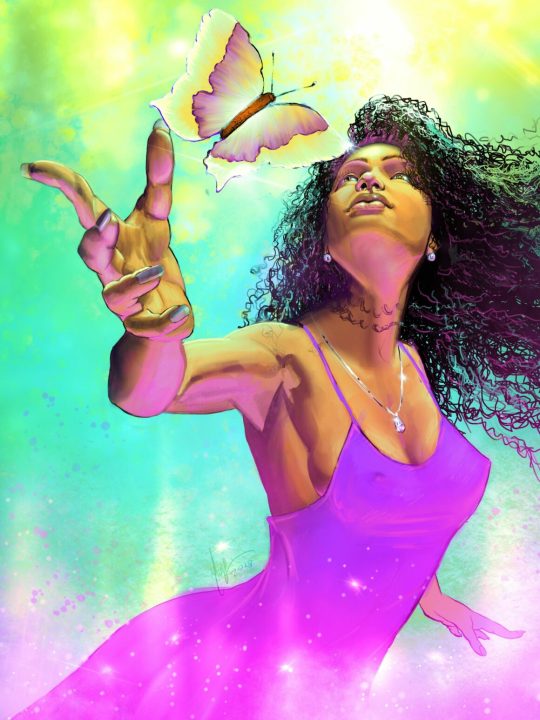
Q. What kind of difficulties have you faced as a black woman in order to become a successful artist and reach where you are today?
Sheeba: One problem is this overall ever-present assumption that you lack anything of value or quality. With white men, it’s the opposite. So Black women have to devote more energy into proving otherwise.
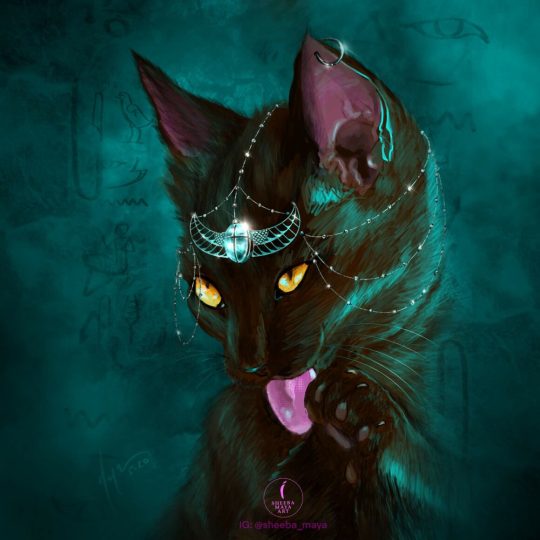
Q. What has your experience with Wacom been like?
Sheeba: Simply amazing! I had my eyes set on them as a client for years. Seeing my art on their platform for the first time was a true thrill. I’m always excited for opportunities to create artwork featuring Black people being powerful and fantastical and designed to be enjoyed by anyone regardless of gender, race, or sexual identity.
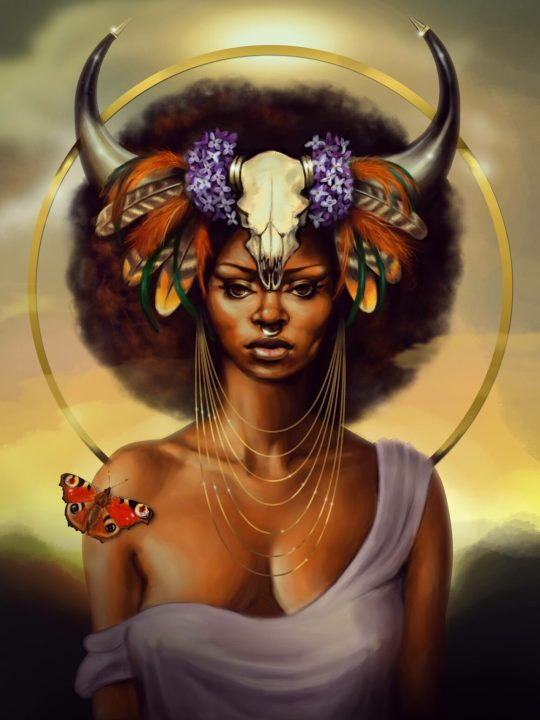
Q. What software do you use to create your illustrations?
Sheeba: I switch between Procreate and Photoshop as my programs of expertise.
Q. What was your experience while visiting countless Comic Cons and creating art for the Nigerian film industry?
Sheeba: I am very eager for comic conventions of all kinds to return. I seriously miss meeting fans, creators, and other industry pros to exchange ideas, inspiration, and support. It wasn’t just the opportunity to sell my art. I participated in panels on everything from gender & race to ideation and concept development. I also hosted workshops on fantasy portraits, color theory, ethnicity and anatomy. and digital painting techniques.

Q. What is the first thing you do when you receive a brief? Describe your process.
Sheeba: The brief is like a little story. And when I read a story, I start to imagine it playing out in my mind. Like a daydream or a mind movie. The moment that best describes the story is the ‘jump off’ concept. From there I can develop that concept or create alternative ideas by asking myself questions and exploring the ‘what if’.
These are jotted down as thumbnail sketches. Thumbnails and related notes/questions are presented for feedback until the concept is worked out and confirmed. From there research for references or related info is performed and the artwork can be fully drawn and then painted to full detail.
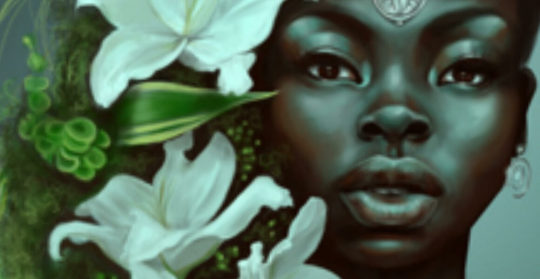
Q. What are some of the most interesting pieces you have worked on so far? And who has been your best client to work with?
Sheeba: One experience that stands out is working with actress Erica Alexander (Living Single, Queen Sugar, Black Lightning). She reached out to me to create illustrative portraits of Michelle Obama and Maxine Waters. The illustrations appeared alongside articles written by Joy Reid (MSNBC) and Alexander herself in a series called MoonRakers featured on medium.com. When Joy Reid mentioned my art, her article and mentioned Michelle Obama in the same tweet!
Another great experience was being hired by comic company Sorghum and Spear to paint collaborating actress Nichelle Nichols (Star Trek OTS) as one of their characters. When they shared a pic of her holding my artwork of her it was a seriously proud moment.
All of the women mentioned are personal heroes and have inspired me to discover, develop, and deliver my greatest potential. These were big-time honours!

Q. What are your plans for the future?
Sheeba: I am very eager for comic conventions of all kinds to return. I seriously miss meeting fans, creators, and other pros. My life and work were like a playland full of visionary and imaginative people that created and sustained it. Since the pandemic, I’ve been indulging in a lot of personal art that explores new aspects of familiar themes like magic, witchcraft and voodoo, Erotica, and cosplay. I’ve been enjoying all this in isolation but now I’m itching to share with the public all these new expressions.
I’ll also be offering art talks, lectures, and classes virtually in the coming year. It’s funny how social distancing actually pushed me towards becoming more accessible. Now that virtual learning and events are becoming the norm, I’m better able to offer these things to people who would like to work together but are not local to NY.
These preliminaries settled, he did not care to put off any longer the execution of his design, urged on to it by the thought of all the world was losing by his delay, seeing what wrongs he intended to right, grievances to redress, injustices to repair, abuses to remove, and duties to discharge.
ORDER A CUSTOM ILLUSTRATION
0 notes
Text
CHAPTER 25 - Creep
He wasn’t back soon.
Sasuke slept in his own bed for the first time in over a month, and spent the night wondering what he was missing. There was obviously something, and not just the events that were currently going on and Sasuke wasn’t there to see. But however long Sasuke stared up at the ceiling and tried to puzzle out Naruto’s concerns, it wasn’t long enough.
At about ten in the morning, Naruto flashed back into existence, this time with Shikamaru and their complete assortment of luggage in tow.
“Let me explain,” Shikamaru said the second Sasuke opened his front door. He had a hand over Naruto’s mouth and turned his perpetually unimpressed gaze onto Sasuke. “Sasuke, we all need to talk. Let’s get inside.”
They got inside.
Sasuke started making tea, watching Shikamaru and Naruto cautiously out of the corner of his eye while they muttered between themselves.
“Just like you practiced,” Shikamaru told Naruto, who looked nervous. He looked nervous about talking to Sasuke, and Sasuke couldn’t remember ever seeing that before. Ever.
“Sasuke, I’d like to bring up the baby topic again,” Naruto said. “Specifically Hinata. We should make her a second baby whether or not the baby becomes a jinchuuriki. If she says no to the jinchuuriki part, we have another kid. If she says yes, we stay with one baby each. What do you think?”
That…was not the topic Sasuke expected. He watched Naruto with a frown, and then glanced over at Shikamaru.
“Just humor him. He’s getting to it,” Shikamaru said with a stunning amount of patience.
So, Sasuke pulled out three cups, pouring each of them some tea as he said, “She’s going to say no to the bijuu. After Kazuki, we know the Hyuuga clan will only accept a standard-issue Hyuuga, and that means no jinchuuriki. Which means we end up having a baby.”
Naruto dumped the same disgusting as ever amount of sugar into his tea with a shrug. “Okay, so I’m not excited about the infant care part, but who ever is? Actual baby babies aren’t fun. But even without the whole ‘saving the human-nature spirit connection from destruction when I die’ part, I’m kind of…I kind of like the idea of a you and me baby? And seriously, how awesome would our kid turn out?”
He didn’t like the idea of bringing a child into the world without feeling the glorious loving enthusiasm he had for Sarada, but Naruto did have a point. Their kid would be pretty awesome. Still, Sasuke took a sip of tea to give himself time to formulate a reply. “The timetable would be tricky,” he said, and ignored the ecstatic grin that broke across Naruto’s face. Or tried to, at least. “I’m going to be pretty busy in a month, since you’re giving me another genin team, which I’m pretty sure is against the rules-”
“It’s not,” Shikamaru provided.
“Whatever. But I’m not going to be able to create a foolproof you-and-Hinata baby seal and a jinchuuriki-bonding baby seal for us in one month. You either get me training a genin team, or me making us a baby. I can’t do both,” Sasuke said. And it was true. No matter how involved the bijuu claimed they would be or how easy they could make the process, the fact remained that they both had male chakra.
Bolt existed because Kurama could be male, female, or any other gender the fox desired. Kaguya Lee existed because it was technically Sasuke, Rock Lee, and Kaguya herself who had given birth to Kaguya Lee – two male chakra signatures, but in the end it was actually one very powerful and very female soul being given a body.
A Sasuke-Naruto baby would be two male chakra signatures, and one bijuu tossed in to fool Sasuke’s jutsu and get sealed inside the tiny creation. It would be tricky, and if there was one thing Sasuke wasn’t willing to fuck up, it was magically creating babies. Particularly if it was their baby.
“That’s fine! The bijuu can wait until the next chuunin exam,” Naruto said. “Maybe they’ll use the time to decide which one of them is getting sealed in a human again. And also you shouldn’t spend much time with your creepy genin team because I’m pretty sure they’re going to try and kidnap you.”
“What?”
“I’ve only had the opportunity to really observe Eichiro – who goes by Uchiha Eichiro when you aren’t around – but it’s enough that I can tell his obsession with you is getting to a dangerous level,” Shikamaru said, and finally started drinking his tea with a heavy sigh. “It starts with if I’m good enough, he’ll love me, and then moves on to I’ll convince him, I’ll make him love me, until it reaches the if I can’t have him, nobody can stage.” Shikamaru looked up, eyes piercing into Sasuke’s even with the curtain of hair covering one of them. “Eichiro is now at the second stage.”
Sasuke scoffed. “That’s-”
“Eichiro is now at the second stage,” Shikamaru repeated. “He gave you a report about an attempt on Naruto’s life, which he stopped. He offered to present Konoha the entire village of Oto on a silver platter. He expressed regret you know he doesn’t feel. All of it was lies, and all of it was for your benefit. None of his work got your genin team, Eichiro most of all, what they want. They threw all of their best attempts at you, and they didn’t work.” Shikamaru sighed again, taking another sip of tea. “I was watching him closely during your exhibition match, Sasuke. He snapped when you started smiling.”
“I didn’t smile.”
“Yeah you did,” Naruto said, and grinned at the memory. “You were having so much fun, it almost made me want to join in until you went all avenger-mode.”
“Which was also Eichiro’s doing, in a way,” Shikamaru added. “Akishige’s regular taijutsu technique is a fluid state of movement, not-”
“Wait. Wait wait wait, Eichiro told him to do that?” Naruto asked. When Shikamaru nodded affirmation, Naruto demanded, “Why?”
“Because mental instability is the easy gateway to manipulation,” Shikamaru said, and paused briefly for another sip of tea. “You break someone, and then you can piece them back together how you want.”
“This is ridiculous,” Sasuke said. “They’re not trying to mind-wipe me. They’re just…” He frowned, looking for an adequate word. “They’re lost, they’re still stuck in their own heads, and they need help.”
Shikamaru sighed (he did that a lot) and slumped against the table, looking towards Naruto. “You’re the only one who can ever make him listen.”
Naruto frowned. “Sasuke, I know you still think you need to take care of your creepy genin,” he began carefully. “I know you still see them as children you need to protect, even from themselves. It’s good of you to think that, but they’re beyond help.”
Uzumaki Naruto saying someone was beyond help, or beyond saving was laughable. And Sasuke laughed, backing away from the kitchen counter and saying, “Says the idiot who tried to save me. For years and years, people told you I was beyond help, and-”
“That’s because you’re different, Sasuke!” Naruto shouted. “It was a completely different situation! You ran off to try and get strong enough to kill Itachi, which you were kind of justifiably obsessed with after all the manipulative shit people kept doing to you.” He scowled. “Which people keep doing to you, and you’re not seeing it – and that’s the point! You not seeing it or noticing it or whatever is their goal, but we’re here. And we see it. So trust us, trust me, and stay away from Eichiro.”
Sasuke did trust Naruto. He trusted him with everything, and the dissonance in Sasuke’s mind ached as he tried to resolve the conflicting truths of ‘Naruto wouldn’t lie about this’ and ‘my genin team is team and needs my help.’ It left him pressing his head against the sink, trying to find comfort in the cool metal against his forehead.
“I can’t see it,” Sasuke whispered, a final confession. “But I trust you can.”
“There are things we can’t tell you, proof we aren’t allowed to provide, but Naruto’s right. You need to trust us on this. They want their Kage, and they’re willing to do anything,” Shikamaru said.
How many times had his creepy genin team told him he couldn’t understand their feelings? They’d attributed it to his own background every time, like Sasuke was the mentally unstable one of the group. And fine, Sasuke wasn’t exactly a paragon of mental health or anything, but he should’ve seen that there was something skewed about how they thought of him. He’d known they were creepy and obsessive, but…did he even want to know the things Naruto and Shikamaru were keeping from him?
“They aren’t beyond saving, Naruto,” Sasuke said, raising his head to look Naruto in the eye. “I’ll stay away from them, but they aren’t beyond saving.”
“Your team hunted down Kisame and tortured him to death for information about Itachi,” Naruto said, dead serious.
“Kisame was already dead,” Sasuke said.
Naruto shook his head. “He managed to survive, he got his brain in a shark summon that turned half-human or something, it was weird – anyway, point is, he’s definitely dead now because your creepy genin team found him in a tiny village where he was living peacefully and killed him,” Naruto said, and gave Sasuke a pointed look. “So they would have information on Itachi. Which gave them sensitive information on you.”
“Are we ignoring the information-sharing Sasuke policy now?” Shikamaru asked.
“For this? Yeah,” Naruto said firmly. “Listen to me, Sasuke. Eichiro is smart, and he’s obsessed, and he has one goal. It’s not – fine, so maybe they aren’t beyond saving, but they are past the point where they’re safe for you to be around, okay? Can you accept at least that much?”
Sasuke nodded, staring at the wall.
“Give us a minute, Shikamaru,” Naruto said, and Shikamaru obliged, up and out the front door without a word. “Look, you know about the policy where we keep you out of the loop and the council keeps it’s mouth shut about my ex-traitor co-parent?” Sasuke nodded again. “Screw it. This is a big deal, and you deserve to know this shit. If you have a question, if you want to know about what your creepy-”
“I don’t,” Sasuke said.
“If you change your mind, the offer’s not going away, okay?”
“I won’t.”
Sasuke went for a walk. He wasn’t due back in Konoha for another week, so he took a walk for four days, came back, and cleaned the house and tried to get his shit together for the other three days. And when Sarada and Bolt came back through the front door Sasuke had to fight back tears because finally, finally he was holding his kids and the were so excited and so happy and Sasuke hugged them so hard it had to hurt as he choked out, “I missed you too.”
6 notes
·
View notes